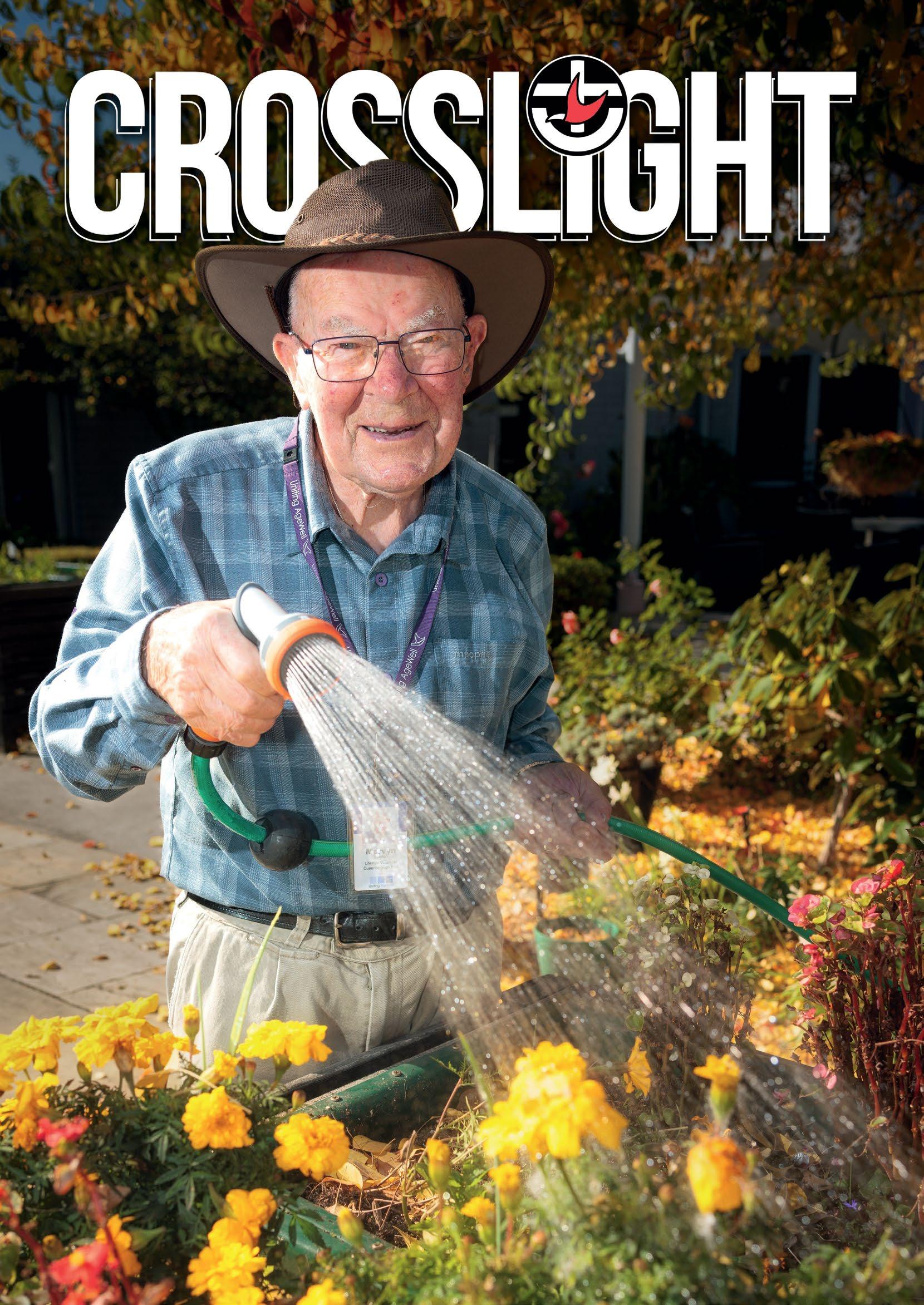
october 2023 home & hosed Volunteers branch out P18 synod 2023 Members get ready to gather P4 Write on Authors discuss their work P12
I’ve recently found myself reflecting on the passage in 1 Corinthians 3, where Paul talks about the foolishness of one follower of Christ saying “I belong to Paul”, while someone else says “I belong to Apollos”, when ultimately all belong to Christ, and Christ belongs to God - as Paul concludes at the end of that chapter.
Along the way through the chapter Paul talks about how anyone involved in the work of building up the community in the love of God is a co-labourer with God.
We work with confidence that God’s Spirit is in us together, and with humility about the limits of our own understanding.
This passage has plenty to say to us among the broad family that is the Uniting Church across Victoria and Tasmania. It has plenty to say about relationships with other denominations too.
While I usually prefer to think of our relationship with God as being that of children or friends who are beloved of God, there is some value in the language of being co-labourers when we are talking about the work of building up the community in the love of God – and the point that Paul makes in this passage is that we are labourers together.
One of the key projects that I’m involved in as Moderator is the Faithful Futures Project, which is very much about the presbyteries and the Synod working together to help to plan for the Church over the next 10-15 years.
I’ve mentioned this project a few times, but as not everyone knows all of
the details let me answer a few questions about it here.
What is the Faithful Futures Project?

The Faithful Futures Project is working to prepare the church for the next 10 to 15 years. The project was initiated out of conversation at the Presbytery Synod Forum recognising that there are common challenges and opportunities for the church right across Victoria and Tasmania.
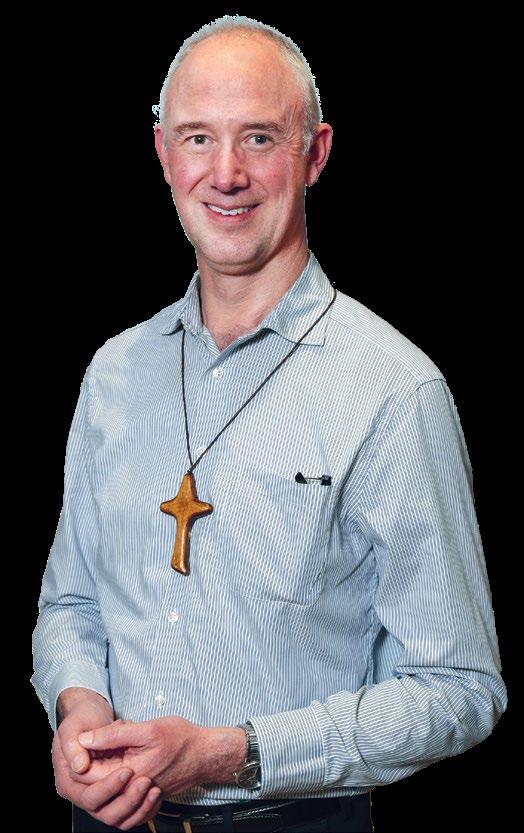
Some of the challenges include the changing age profile and size of congregations, availability of leadership, and the burden of property maintenance. Some of the opportunities include growing in ways of worship, witness and service that are already being experimented with, listening for where God’s Spirit is inviting us to reach out in faith, love and hope.
Who is involved in the project?
Project meetings have included up to two members of each Presbytery, along with up to two from the Synod Standing Committee, with me chairing. A member of the Synod Intercultural Forum has always been invited. Contributions from members of eLM and representatives from Uniting Vic.Tas and Uniting AgeWell have also been welcomed.
After the initial meeting, a small steering group consisting of Prof Tom Spurling (Port Phillip East), Deb Bye (Gippsland), Rev Linley Liersch (Port Phillip West) and myself have been meeting regularly to help to guide the Project.
What is the vision?
The Vision of Following Christ, walking together as First and Second Peoples,
2
Reverend David Fotheringham Moderator
Vic Tas Synod
"The Faithful Futures Project is working to prepare the church for the next 10 to 15 years. The project was initiated out of conversation at the Presbytery Synod Forum recognising that there are common challenges and opportunities for the church right across Victoria and Tasmania."
seeking community, compassion and justice for all creation resonates strongly through the Uniting Church across Victoria and Tasmania. Some presbyteries have this (or similar) as their vision statement; it has been the vision statement for the Synod since 2016. More information about the statement can be found at victas.uca.org.au/vision-andmission.
What is the hoped for outcome of the project?
All presbyteries have various versions and degrees of strategic planning, which was our starting point - along with the strategic framework for the Synod, which is due for renewal in any case. Given the common challenges and opportunities, albeit with plenty of local particularities, it makes sense for some strategic planning to be shared commonly across Victoria and Tasmania.
The project aims to produce a statement of the vision and goals for the Uniting Church in Victoria and Tasmania that is simple and straightforward, with some clear goals that can help to direct the allocation of resources for the sake of the worship, witness and service of the church into the future.
How does this link to Act2?
Act2 is the national project which is working to discern and make decisions about the ongoing shape of the Church in response to God’s call. The projects link in several ways. One stream of the Act2 project is working towards structures that are most helpful for supporting communities of faith in various forms, which will support the possibilities we may discern.
One of the other streams of Act2 is considering the restructuring of the responsibilities and boundaries of area and regional councils of the Church, to address a number of developing issues and to provide greater flexibility.
The Faithful Futures Project will ensure that we have some common planning and focus across Victoria and Tasmania that will be able to stand, and guide resource planning, even if structural changes occur.
What happens next?
Presbyteries, and the meeting of the Synod, are going to be asked to engage in deep discernment about how we can best respond to the vision of Following Christ, walking together as First and Second Peoples, seeking community, compassion and justice for all creation into the next 10 to 15 years – which means looking beyond some of our current worship, witness and service arrangements ahead to where we discern God’s invitation for particular effort into the future.

What difference will it make?
Having a broad strategic plan does not in any way replace the call for personal and local discipleship and discernment; nor does a strategic plan in or of itself “save the church”. As individuals and communities of faith we are called to following Christ in all sorts of ways, which involve generosity, hope-sharing, compassion and care.
Having a clear vision and goals will help to provide for sharing faith into the next generation; and the act of working together on the vision and goals will help to ensure that the goals and
resource provisions are most helpful and appropriate.
Which brings me back to 1 Corinthians 3, and the ways in which we are all called to be co-labourers together. Presbyteries are one way of bringing together wisdom from across regions to provide oversight for those regions. The participation of members from across the regions, listening together for God’s call, is what makes them work.
I also want to briefly mention the Synod Standing Committee, since we are approaching another Synod Meeting at which some of the membership is likely to change over. It is marvellous having a team of people from such a range of backgrounds, bringing together diligence, prayer, creativity and attention for overseeing the responsibilities of the Synod between Synod meetings.
The current SSC includes members from regional, rural, and suburban places and forms of worship, in which worship is celebrated in traditional, creative, and various language styles. They have interests including intercultural inclusion, tech, ecumenism, camping, ministry with children, finance and property, and also manage to be involved in their wider communities through activities like the CFA, Girl Guides, basketball, environment groups and food security initiatives. As the Synod meeting approaches, I encourage your consideration of the membership of the SSC for the next few years.
In all of our labour, our rest, and our faithful living may God bless us with humility and love, for God’s spirit dwells in us together; and we all belong to Christ, and Christ belongs to God.
3
WE BELONG TO THEDAY
Future the focus of
As the National Assembly considers the Uniting Church’s long-term future through the Act2 Project, Victorian and Tasmanian members will meet next month with a complementary item of importance on the agenda.
The Faithful Futures Project will be a key discussion area when Synod 2023 takes place at Box Hill Town Hall from November 18-21.
As well as Faithful Futures, Synod 2023 will consider a response to the Act2 Project, explore future directions for ministry and mission, and discuss a range of other issues of importance to members.
Moderator, Rev David Fotheringham, says the Faithful Futures Project will play a pivotal role in informing directions and missional emphases for the Church across Victoria and Tasmania for the next 10 to 15 years.
“Faithful Futures aims to produce a statement of the vision and goals for the Uniting Church in Victoria and Tasmania that is simple and straightforward, with some clear goals that can help to direct the allocation of resources for the sake of the Church’s worship, witness and service into the future,” David says.
Key Synod 2023 elements include, for the first time, a welcome dinner on the opening night, as well as opening and closing worship, daily devotions, Bible studies to be led by Rev Robyn Whitaker from Pilgrim Theological College, and a Tributes Service on Sunday, November
By Andrew Humphries
19 recognising important milestones in ministry.
Guest preacher for the opening service will be First Peoples Christian leader, international speaker, writer, educator and poet Brooke Prentis, who will also provide theological reflection for the Synod towards the close of each day This Synod meeting will also include discernment and a ballot for the Moderator-elect, who will be installed as Moderator at the 2025 Synod meeting.
General Secretary Rev Dr Mark Lawrence says Synod Meetings, held about every 18 months, play a vital role in keeping Victorian and Tasmanian members abreast of issues of importance, and the opportunity to provide input into those.
“Synod Meetings are important for a number of reasons,” Mark says.
“It’s a good way to hear reports about Synod units and committees, not just for the sake of reporting, but to also hear how the Synod has been engaging in ministry and mission, and stewardship of resources for the wider Church.
“It’s also important because the Church’s worship, witness, and service is undertaken in community, and this is the community of the Synod coming together.
“It’s good to share with other Christians in occasions such as a Synod meeting opportunities and challenges regarding faith, life and mission.
“It can also be a really uplifting
experience for members to hear what is going on around the Synod, to be part of the Bible studies and worship, and be encouraged in their church leadership and personal discipleship.”

Ballots will take place during Synod 2023 to elect members to the Synod Standing Committee and membership of next year’s 17th Assembly, in which decisions around Act2 will begin shaping the Church for the future.
“Synod members are encouraged to consider being nominated for the Standing Committee because it does the ongoing work of the Synod between Synod Meetings,” Mark says.
“We will also be electing Synod members to attend the 17th Assembly next year, and that’s where some significant Act2-related decisions will be made, so I want to encourage people to reflect seriously about being nominated for that important meeting.”
For the first time during a Synod Meeting, a number of elective sessions will be held, with those confirmed so far including a discussion led by Brooke Prentis on the Church and reconciliation beyond the referendum, Andy Calder on disability inclusion, and Uniting World’s Mardi Lumsden on real-life challenges for people living in a remote village.
It will also be the first Synod Meeting planned largely by the Synod Meeting Planning Committee, which was formed following last year’s Synod meeting.

“The committee will have been



4
1 Th essaloni an s 5: 8 Lorem ipsum
in place for about 12 months by the time we hold Synod 2023 and it has been building on what the Business Committee and the Creative Design Team have previously brought to Synod Meetings,” Mark says.
“Members will see a couple of changes in the program that we hope will build community and further contribute to people having a positive experience of the event.
“For example, the dinner on the Saturday night will help people to meet each other, socialise and get a sense of being part of the whole meeting.”
Mark hopes members will depart Synod 2023 much richer for the experience.
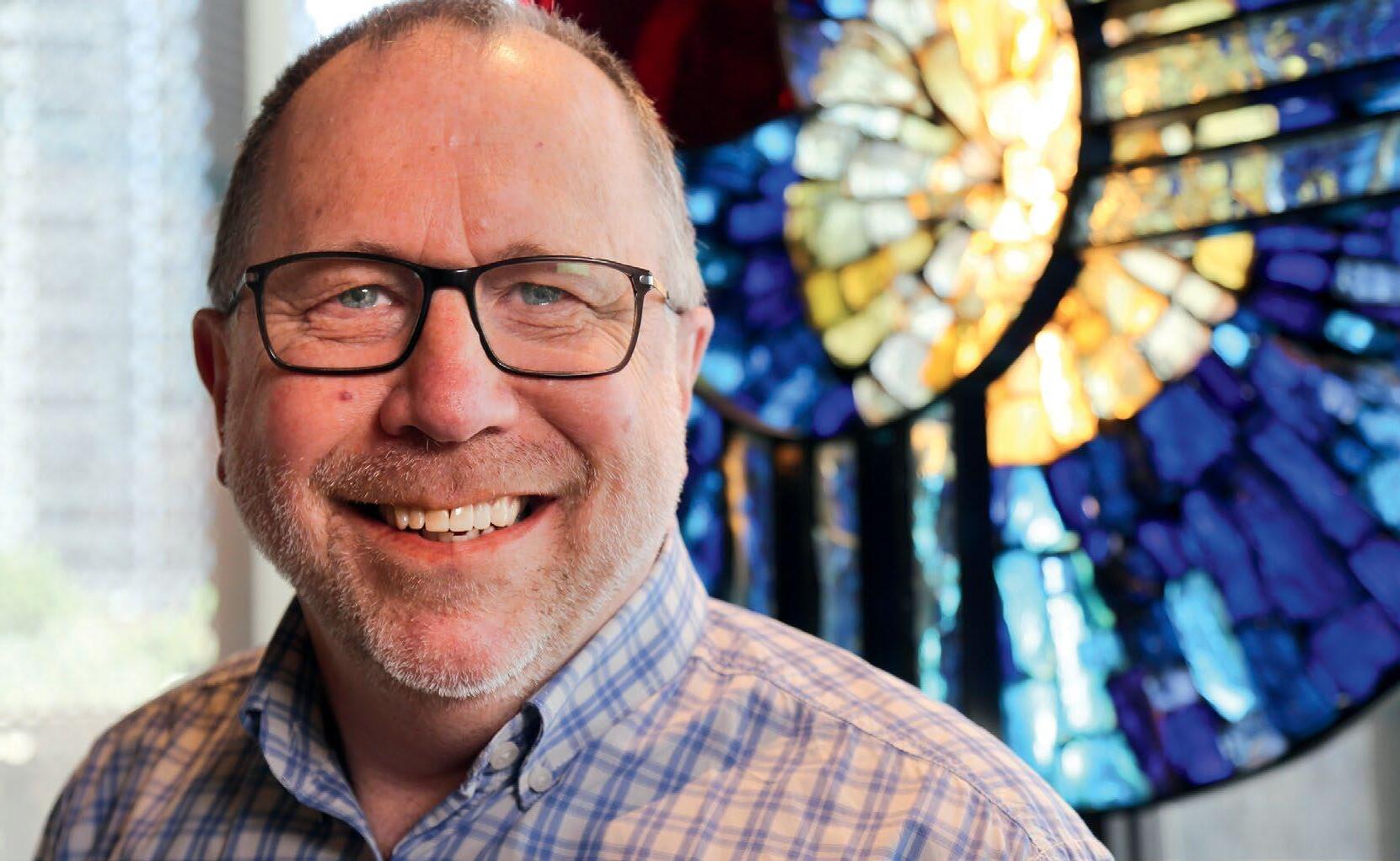
“I hope they leave with a sense of feeling encouraged and hopeful about participating in, and contributing to, the life of the Church, and that what they have heard and learnt will resource them in their daily engagement with it,” he says.
“I hope members have a rewarding time, including being challenged during those four days, and leave Synod 2023 ready to share our story and encourage others to be enthusiastic about the
work of the Uniting Church. We are a particularly distinctive denomination and we have expressed a commitment to inclusion and diversity, while grappling with some of the more complex issues relating to society.
“That’s a particular kind of Church to be part of, so I hope that Synod members will be able to share that kind of story with their congregations, presbyteries, or other institutions of the Church.”
Synod 2023, including the opening worship, will be streamed online, with the link available at www.victas. uca.org.au closer to the date.
Worship in good hands
Two of the worship highlights at Synod 2023 will be Bible Studies, led by Pilgrim Theological College Rev Associate Professor Robyn Whitaker, and the appearance of guest preacher Brooke Prentis, who will preach at the opening service and also provide theological reflections each day.
Robyn’s Bible Studies will focus on the Synod 2023 theme of “We Belong to the Day”.
“‘We Belong to the Day’ is a phrase from 1 Thessalonians, the earliest letter of Paul and the most ancient Christian text on record,” Robyn says.
“Paul evokes biblical themes with this simple phrase. In the Bible we hear about the day of the Lord, the day of Judgment, Sabbath day, day of atonement, and the day of wrath to name a few.
“Some of these days are festivals or regular events and some are future hypothetical days associated with the return of the Messiah or inbreaking of God.
“So when Paul writes ‘we belong to the day’, which day might he have had in mind?
“The Bible Studies will explore what it means for Christians to live in a way that honours the present day (the current cultural moment) but also live as people shaped by the future day God has promised.”
Brooke is a Christian leader, writer, speaker and poet, a descendant of the Wakka Wakka peoples, and has a strong commitment to reconciliation.
“I have loved building relationships with Aboriginal people through the Grasstree Gathering, a growing network of over 200 Aboriginal and Torres Strait Islander Christian leaders throughout Australia,” Brooke says.
“I share a message of reconciliation as friendship and speak on issues of justice affecting Australia.
“I dream and work towards inviting people to work together ‘to build an Australia built on truth, justice, love and hope’.”
5
General Secretary Mark Lawrence.
Image: Carl Rainer
Care and support tailored just for you with Uniting AgeWell
Help
Get assistance with personal and clinical care, household chores, assistive technology and transport
Community support and wellbeing
Remain connected with social groups, outings, health and therapy services, seniors gym and carer services
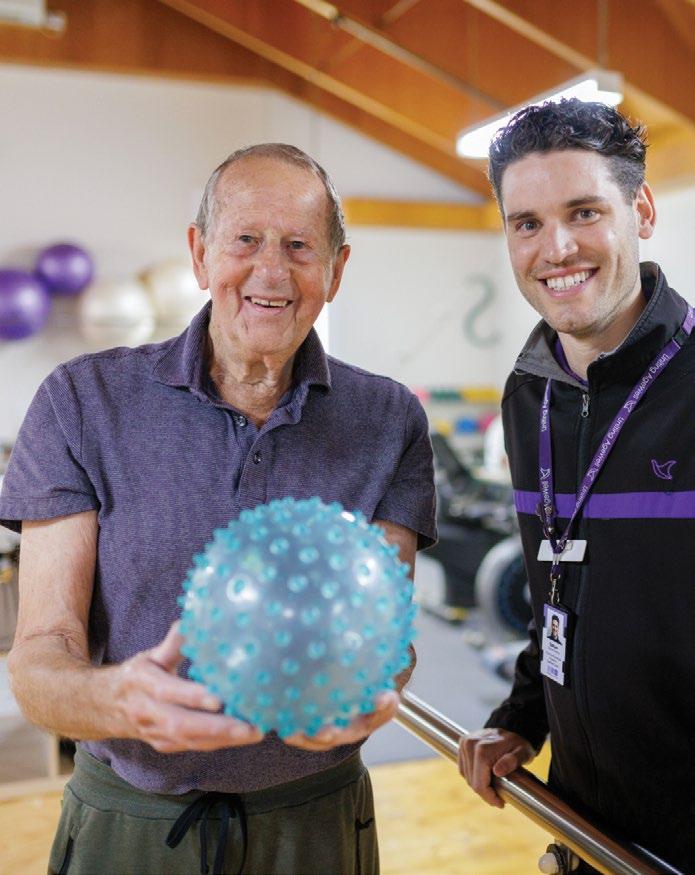
Independent living
Maintain an independent lifestyle in one of our vibrant retirement living communities
Residential care
Specialist 24/7 care and support, including dementia and palliative care and respite stays, within safe and caring communities
6 You can make an ongoing difference.
giving a monthly gift of just $20 a month, you can make a big difference to a family in crisis. When becoming a regular supporter, you can support a program of your choice, helping individuals, families and communities across Victoria and Tasmania. Register today to become a regular supporter. Call us 1800 668 426 Visit unitingvictas.org.au/regular-giving Uniting is the community services organisation of the Uniting Church in Victoria and Tasmania.
well with choice and peace of mind
By
Living
at home
services across Victoria and Tasmania, Uniting AgeWell's expert team can help you find the right services to meet your needs Call us today!
783 435
unitingagewell.org With
1300
Why say no?
Ahead of the October 14 referendum on placing an indigenous Voice to Parliament in the Constitution, Tasmanian Uniting Aboriginal and Islander Christian Congress spokeswoman Alison Overeem urges Australia to vote yes.
My voice and my family’s voice and our family matriarch’s voice, Fanny Cochrane Smith, is still here, on the lands, on the sands, in the waterways, in the forever time and all days. May all the voices be heard May all the voices be upheld and stirred weaving and unweaving across lutruwita weaving and unweaving across milaythina mana mapali (lots of country)
Whispering in the pungkatina (bush)
Flowing, growing and all knowing from the muka (water) The voices of the Muwinina people
Of all knowing and all being ancient wisdom and knowledge
Heard
Held
Felt
The broken
The unspoken
The silence
The colonial violence
A yes vote is a yes to all the stories woven in every footprint of 65,000-plus years Of struggle, survival, resilience and tears
If we say no
How will we as a nation grow?
We know in people’s takila (heart) the call is these ancient storylines and songlines of woven voices to be held and nurtured For recognition and a voice for self-determination, this is what a yes is for this nation.
This is a yes from the heart
To weave together a pathway for restorative justice, truth and treaty - to weave us all together - not divide or bring us apart This is a call for a yes from your heart
To kani (say) Yes is the first step to footprints of justice that will give voices to the policies of a nation weaving the threads of first peoples self-determination May our hearts be woven in the yes for a healing of a nation
It’s time
It’s now

It’s yes
I hear my old people I hear the voices
We can together be the shared weaving voice of the tirrina (basket) of new hope
Let’s weave together our shared voice and story
Alison Overeem is a proud palawa woman from south-east Tasmania
A


























































































Sunday.Makesureto
shopforthe kitchen week in the l ife Of
Rev Natalie Dixon-Monu. Minister and co-ordinator at Boroondara Community Outreach
4-7.30pm:
SUNDAY MONDAY TUESDAY WEDNESDAY THURS
Today marks the start of a typically busy week, as I get Boroondara Community Outreach ready to support a large number of people. BCO, which offers a range of services, was established by the Uniting Church in 1993 as a mental health ministry, supported by the Presbytery of Yarra Yarra. We support people who are socially isolated or living with a mental illness, to live with dignity and engage in community.
3-4pm:
I set up the church and lead the monthly church service, then help serve the meal, have a chat with those attending and clean up.
FRI SATUR
SUNDAY MONDAY TUESDAY WEDNESDAY FRIDAY SATURDAY
I shop for the kitchen, liaise with volunteer cooks regarding what is being prepared, and set up the hall for the meal.
8.40-10am:
The fruit and vegetables donation from Toscano’s is collected and I shop for the kitchen cooks. Donations are unloaded, emergency relief is set up, then it’s lunch and the art group gathering. I’m also liaising with cooks in the kitchen regarding food for the lunch and meals to be made for the freezer, while donations of bread are unloaded.
8
Tuesday. Meet victimwith domesticof violence forTackleMonday.finances BCO
10am-4.30pm:
I open emergency relief for people, which includes families and those with no income, an art group of 10 people meets, and 25 people attend the community lunch. This is also the time of day we support rough sleepers, who have access to laptops, a washing machine and food. The last 45 minutes is spent packing up the hall and kitchen.
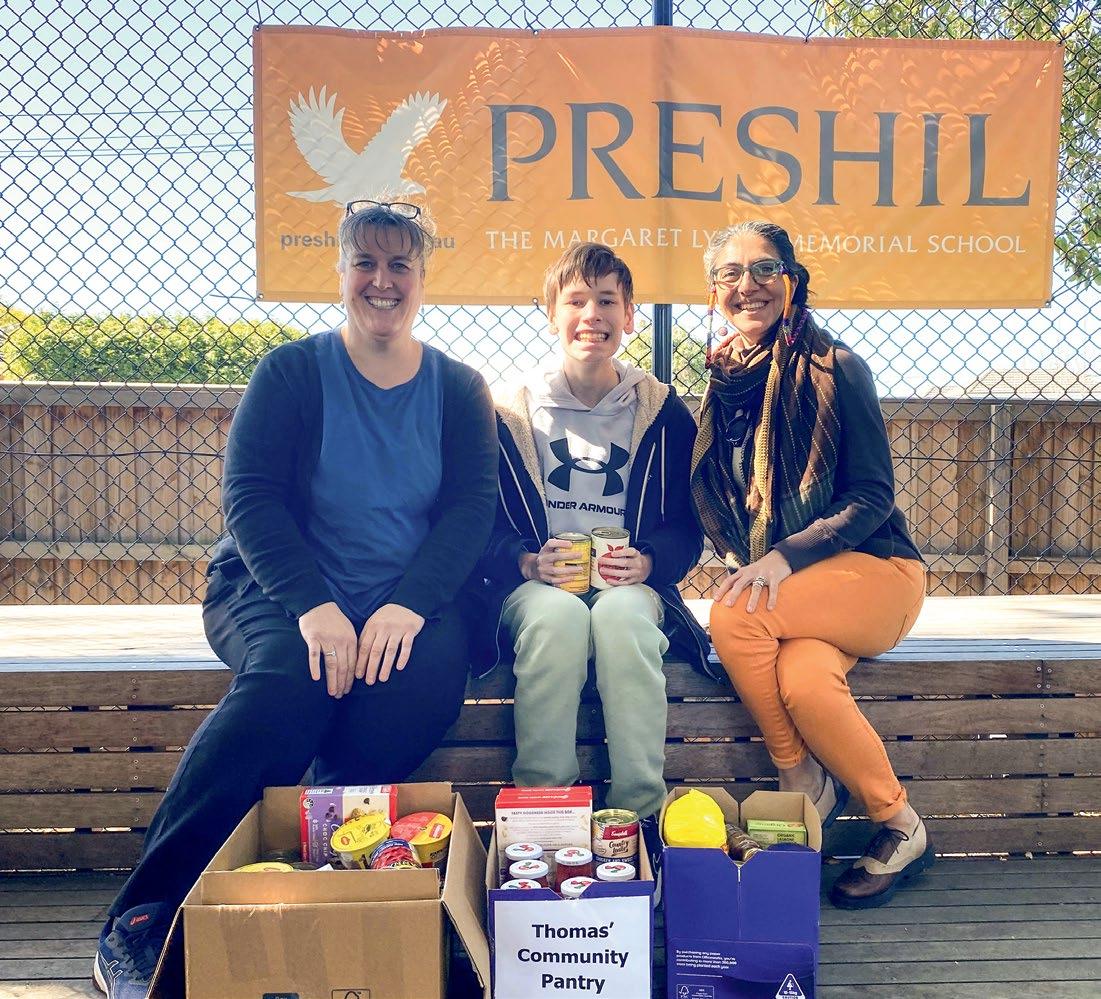
A big part of my role as BCO coordinator is pastoral care, and that involves helping people with all sorts of issues. I help a single mum who has suffered domestic violence and whose daughter’s mental health is very poor. A migrant woman has significant health issues, along with her husband and daughter and, with none of them able to work and being on bridging visas, they have no access to Centrelink assistance, so I make an application to an agency to

help fund their medication costs.
I call a GP regarding concern about a woman’s swollen eye following surgery, make contact with police about an altercation between two men down the street, and help a 77-year-old woman look for housing online as her lease ends in two weeks and she has no access to, or competence with, computers. I call a real estate agent for help and organise an inspection of a property for her.
Other actions include an email to a lawyer following up the case of a vulnerable man who had his inheritance stolen by his sister, participating in a child protection case conference regarding what supports we are offering the family, and talking with people presenting for emergency relief.
4.30-9pm:
Time with my own family before I tackle finances for BCO.
9
Continued P10
8.30am-4.30pm:
It’s the start of another busy day, and I head off to shop to restock food for a local high school’s wellbeing centre for young people who attend with no lunch. I set up the hall and church for today’s groups and community lunch, and talk with our cooks about lunch and what will be made for the freezer. It’s wonderful to see that 15 volunteers have come in for
A number of groups make use of our facilities, including tai chi, ukulele, a choir that I sing with, and a band. Today’s community lunch caters for 40 people.
Pastoral care today involves a meeting with a volunteer accountant regarding the man whose inheritance was stolen, so plans can be put in place for the
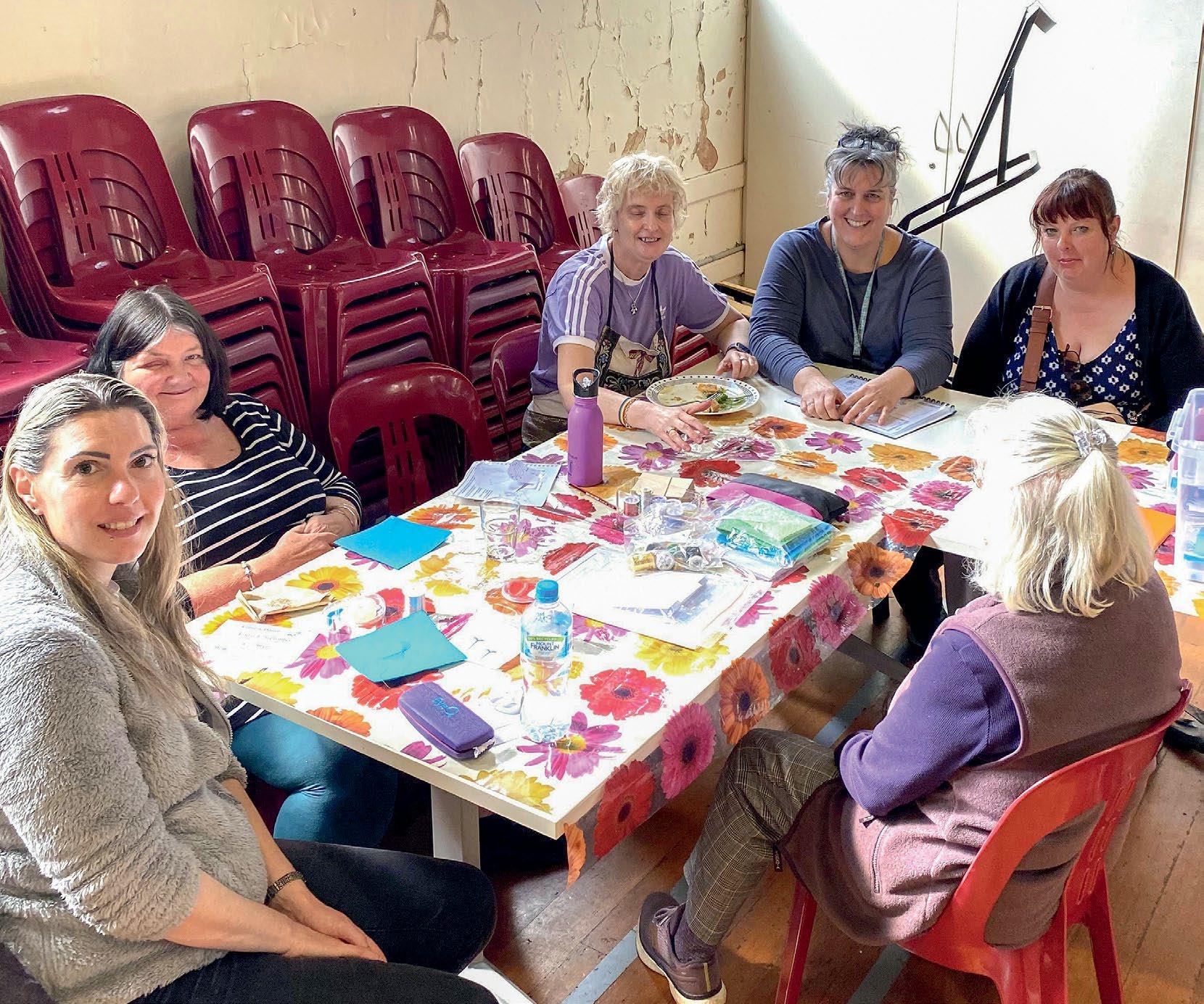
future management of funds, a call to a hospital to follow up on a woman who I reported missing and was found injured in her home, talking to an elderly woman regarding her financial issues, comforting a migrant woman whose husband died unexpectedly a few months ago and left her in a dire financial situation on a student visa, so I have applied for funding at YMCA to cover the cost of her young daughter doing gymnastics and for both of them to have swimming lessons.
5-5.45pm:
























































































DAY TUESDAY WEDNESDAY THURSDAY DAY SATURDAY
I call a hospital to confirm a woman’s appointment and organise a volunteer to take her to the specialist appointment due to her disability.
I meet with a migrant woman who is a victim of domestic violence to help her buy a laptop, as language barriers limit her understanding.
6-9pm:
It’s family time before I meet with 4th Kew Scouts Venturers group, which comes and cooks food for our emergency relief program. I talk with them about some of the issues facing the people we support.
SUNDAY MONDAY TUESDAY WEDNESDAY THURS FRIDAY SATURDAY
I apply to YMCA for a single mum studying and for her young son to be able to do swimming lessons, while administration involves emails, phone calls, the preparation of flyers for a dance, and work on getting ready for BCO’s 30th year celebration.
While BCO itself is closed today, it’s still a busy time involving administration and pastoral care.
10
From P9
9am-12.30pm:
I organise one of our volunteers who collects and delivers Fareshare meals to a rooming house. I have a meeting with our treasurer/chairperson regarding finances and property development of the Kew church, deal with emails and make phone calls, as well as talk with a Boroondara Council employee who is heading to a State Government meeting regarding the impact of cost of living issues and any trends we are seeing in people presenting to BCO for support.
12.30-3.45pm:







































Pastoral care includes helping the 77-year-old lady with an online housing application, emailing Centrelink’s community engagement team regarding two people, following up a grant application with the council, as well as YMCA applications, and ensuring two people have vital medication. I also collect 10 boxes of non-perishable donations from Coles Glenferrie and unload them.
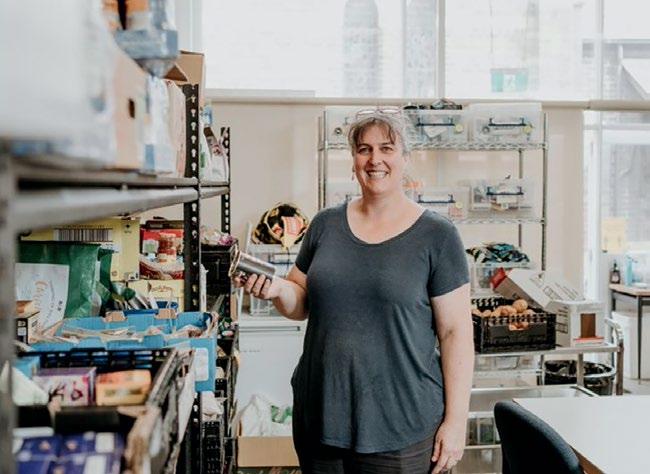
3.45-9.30pm:
Some much needed time with the family, before a pastoral phone call with a migrant woman who had her violent husband served with divorce papers tonight.
WEDNESDAY THURSDAY
8.45am-3.30pm:
I collect fruit and vegetables from Toscano’s and shop at Woolworths for food for our wonderful cooks. The shopping is unloaded and donations set up for emergency relief and our sewing group, before I meet with an IT representative about fixing laptops. I chat with theological students regarding today’s plan, before emergency relief is opened for those needing assistance. A sewing group consisting of 13 people arrives, while 20 people attend our community lunch. An exercise class
Thursday. Meetwith ITtofixthe laptops
run by St. Vincent’s staff is held, while a writing class also takes place.
SUNDAY MONDAY TUES FRIDAY SATUR
Pastoral care involves helping a migrant woman set up her laptop, speaking with a single mum regarding concerns about her children, and receiving a phone call from an agency telling me of approved funding. I also help a woman on a disability pension who has just started part-time work to understand how it will impact on her pension, celebrate with an elderly 71-year-old homeless man who comes to
10am-12.30pm:







I have a meeting with admin support officer Alex about finances and the organisation of our 30th year celebration, and I visit Preshil school to collect donations at assembly and thank the year 8 student who organised the food drive, before I unload and unpack donations.
12.30-3.30pm:
us three days a week and has just been offered housing, and chat with people presenting for emergency relief.
3.30-7pm:
Dinner and family time involving lots of hugs, before I deal with a call from Kew library staff about a homeless man who is hungry and has no bedding. I call a local takeaway and organise some food for him.
8.30-9.30pm:
On my way home from collecting my daughter from drama class, I pick up sleeping bags at the church and take them to the homeless man at the library. I talk with him for a while and give him my phone number to call for tomorrow. I then call police to put him on their radar as I’m quite concerned about his welfare as he is psychiatrically very unwell.
I attend a meeting with Lida, our emergency relief and volunteer co-ordinator, about the list of food for next week, volunteers and rosters. I plan social media for the next week with one of our volunteers, who happens to be my eldest daughter. I check the RSVP list for our 30th year celebration, and work on our Christmas hamper project that provides 600 hampers to vulnerable people in Boroondara. A look at the week’s numbers shows that 195 people came to BCO for support and emergency relief, and 547 meals and 92 nonperishable food parcels, and bread, were distributed. I respond to a text from a teacher at Carey Grammar regarding students volunteering, then help an elderly woman recharge her phone with a voucher. Two rough sleepers are also supported with access to laptops, food and our washing machine.
3.30-7.30pm:
I have dinner with the family and more hugs, before I drop off food for the weekend and talk to library staff and the two homeless men at the library, before I deliver food for a week to an elderly man who has been unwell. I check in with police and St. Vincent’s mental health triage regarding the homeless man at Kew library.
7.30pm:
I turn my phone off and clock off for the weekend.
11 30thorganiseFriday.helpcelebrationsyear
Wednesday. Organise volunteer to collect meals
The write
Pilgrim
Firstly, can you sum up what your recently released book is about?
Sally Douglas (‘Jesus Sophia: Returning to Woman Wisdom in the Bible, Practice, and Prayer’)
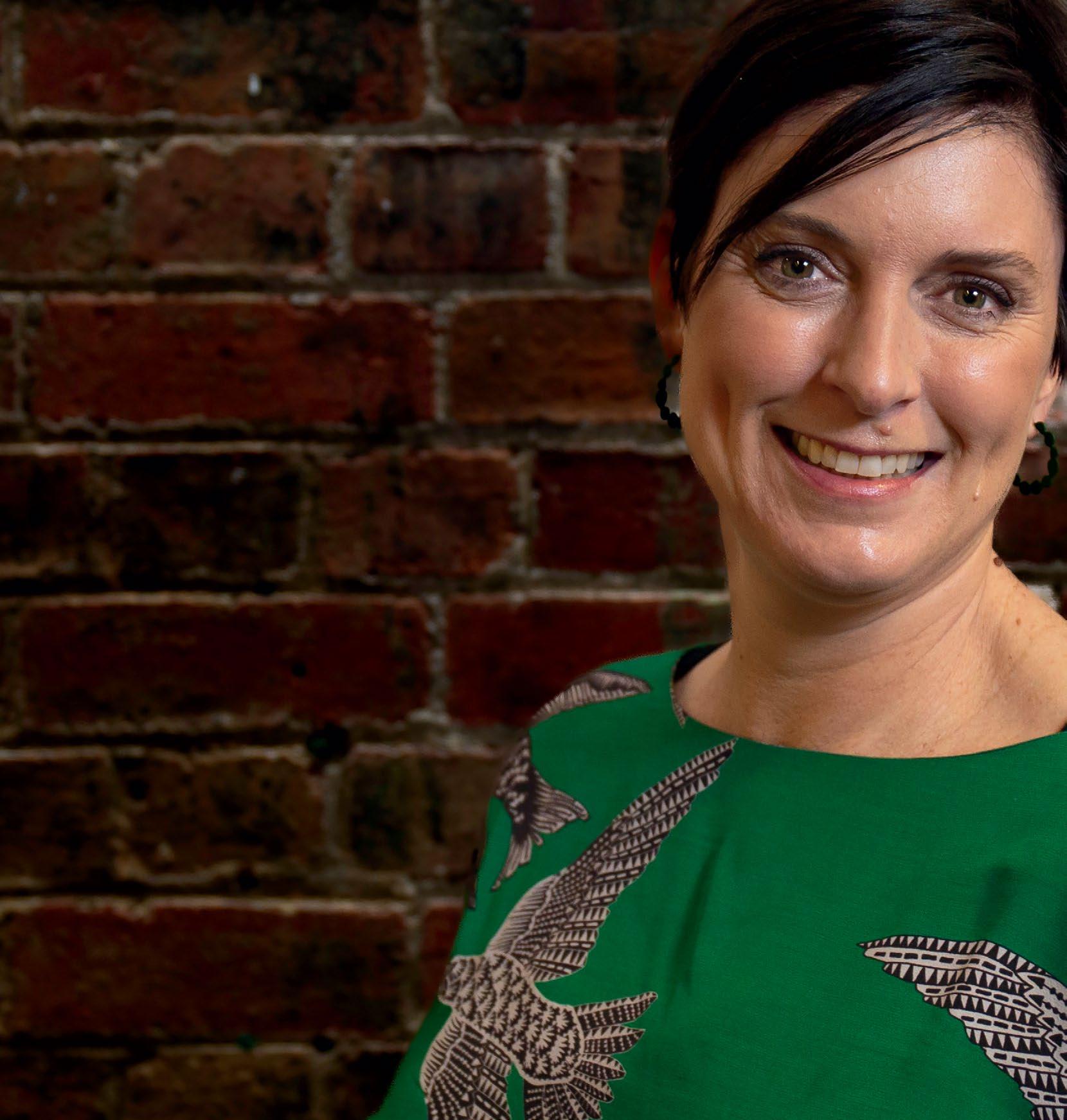
Across Christian traditions the persistence of male language and imagery for God dominates. The consequences of this God talk have been far reaching. Reliance upon male God imagery denies the fullness of God and the fullness of our own humanity,
including the equality of women. However, within the New Testament and in early church texts, Jesus is celebrated in the language and imagery of the female divine, Sophia, Woman Wisdom. In this book I step out the biblical evidence of Jesus Sophia in accessible ways and bring these sources to life. Readers are then invited to explore one of the most crucial theological questions that there is: ‘So what might this mean for how we live?’ Attending to both the implications for the church, and our day
to day lives, this book challenges and prompts readers to take seriously this ancient understanding. Questions about discipleship, biblical interpretation, and theology are investigated. Understandings of the cross are revisited, female imagery for God is reclaimed and celebrated, and fresh and ancient practices of faith are discussed.
12
Robyn Whitaker left, and Sally Douglas are successful theological authors.
Image: Carl Rainer
Theological College academics Rev Dr Sally Douglas and Rev Associate Professor Robyn Whitaker had books published earlier this year. They spoke to Andrew Humphries about the books and everything involved in the writing process.
stuff
Robyn Whitaker (‘Even the Devil Quotes Scripture: Reading the Bible on Its Own Terms’)
My book is about how to read the Bible in a way that is ethical and faithful. Ethical, in the sense of concern for how our interpretation affects real lives, and faithful in the sense of honouring what the Bible is in the Christian tradition. I realised, however, that we can’t talk about how to read the Bible until we talk about what it is. So the first part of the book looks at what the Bible is (and is
not), before arguing for a hermeneutic of love.
What did you hope to achieve when you set out to write it?
Sally : During my doctoral studies I was astonished to discover widespread New Testament and early church understandings of Jesus as the female divine. While this reality is widely accepted within academic biblical studies, this is not known about in many congregations, or in the wider
community. I set out to write a book that would present the biblical evidence in both thorough and accessible ways. I also wanted to invite people into robust conversation and reflection about how reclaiming this, long ignored, strand of Christian tradition might nourish and inform Christian practice and prayer today.
Robyn : I hoped to create a useful and thoughtful resource for thinking Christians who might never go to seminary or theological college but who
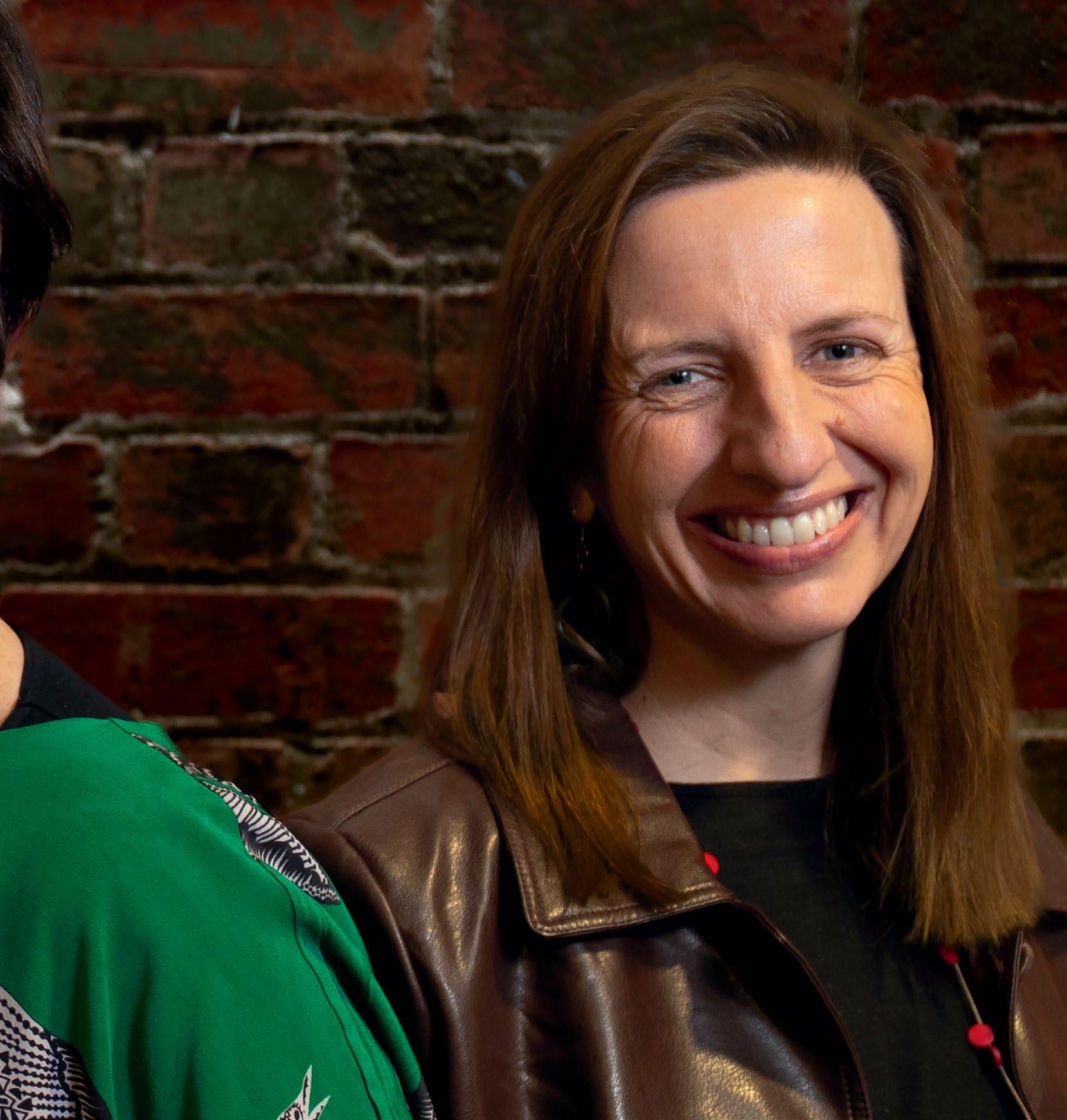
13 Continued P14
want to be stretched in their ideas about the Bible. I hoped to deconstruct and challenge fundamentalist approaches, but also to offer something constructive for people who love the Bible and want to interpret it faithfully.
What prompted this particular subject or field of enquiry?
Sally : Wisdom Christology, that is, understanding Jesus in relation to Sophia, Woman Wisdom, is precious, wild, and faithful. I wanted people to have access to this treasure that resides in our tradition. So many people think that they have to leave Christianity behind if they are seeking female divine imagery. But this is not the case. Not only does this book highlight earliest understandings of Jesus Sophia, this book also highlights aspects of discipleship, such as the importance of friendship and the call to share in hospitality, that have often been considered less important than other "serious" expressions of faithfulness in the church.
Robyn : I felt compelled to write this because I keep meeting Christians who have been hurt by the Bible being used against them or have left very conservative churches yet still want to know how to read it. They have a high view of the Bible and take it seriously but realise a fundamentalist approach does not hold up to scrutiny. This book takes the Bible seriously, but not literally.
What motivates, or inspires, you in the writing process?
Sally : I am motivated by the desire to engage with the complexities of the biblical text and theology and to bring a taste of these to contemporary readers. I am passionate about exploring key questions about the divine, meaning and faithfulness. I also love bringing writers from the early church, and through the centuries, into dialogue with contemporary thought amidst the realities and challenges we are facing.
Robyn : Writing is hard work, and slow. But it helps me to remember why I’m writing and imagine the people for whom I am writing. That, and coffee.
What is the general process you follow in writing something like this?
Sally : When I am writing a book, I tend to map out an outline for the whole book, with notes about the contents for each chapter. I then set myself both micro goals and larger goals for completing various sections by particular dates. My most recent book had a fairly short turn around period and so I set goals to complete each draft
exhausting, energising bliss. It feels like an expression of worship for me – an abiding in God.
Robyn : I often have to drag myself to the writing desk and yet find that when I am there I do enjoy it. Starting is the hardest part.
Does a sense of doubt ever enter the equation?
chapter by a particular month, leaving a healthy amount of time for editing the full manuscript before it was due with the publishers.
Robyn : I had mapped out the book in terms of the general content and had a publisher interested before I started writing. I had also read similar books to see what was out there and where the gaps were. Yet despite that planning, I am the kind of person who works things out in the process of writing. So, once I actually started writing, I found myself doing a deeper dive into things like the doctrine of inerrancy in order to be able to write a few paragraphs on the matter.
Are you someone who thrives during that process or do you find you sometimes have to “drag” yourself to the computer or writing desk?
Sally : Great question. I love writing, especially in the fields of biblical studies and theology, and I miss the writing desk when I am away from it for too long. When I am writing, time often evaporates as I excavate a certain biblical text, wrestle with its theological implications, or pore over the right words to convey a particular idea. When I drop into that "flow state" it is an experience of
Sally : Always remembering your humanity and frailty helps. This, and checking your sources. I seek to be honest when I am offering a minority view. I also never seek to present ideas as though I have all the right answers. Instead, I aim to invite people into the sources and the big questions so they can continue the work themselves. Ongoing prayer and mulling are essential as well, and humility is key.
Robyn : Always. There is always doubt. You wonder if anyone else cares in the way you do. Does the world really need another book about how to read the Bible? I decided they might since no one has written a book quite like this.
How do you juggle writing with the many other things going on in your life?
Sally : It takes a great deal of discipline. I am 0.8 in the parish I serve (four days a week) rather than full time (five days a week). This enables me to have a writing day each week. Or, if I work full time for a few weeks in a row, I then take those days back in the fourth week so that I can create something of a "writing week" each month. This has helped to create sustained space to write my last two books, as well as articles and book chapters. However, it is tricky and tiring as inevitably there are parish and wider church demands that impact upon this writing time and I can end up working very long days in those weeks. I seek to utilise the two study weeks that all ministers are expected to take each year for research and writing. As well as this,
14
"I am passionate about exploring key questions about the divine, meaning and faithfulness "
From P13 Continued P16
Rev Dr Sally Douglas
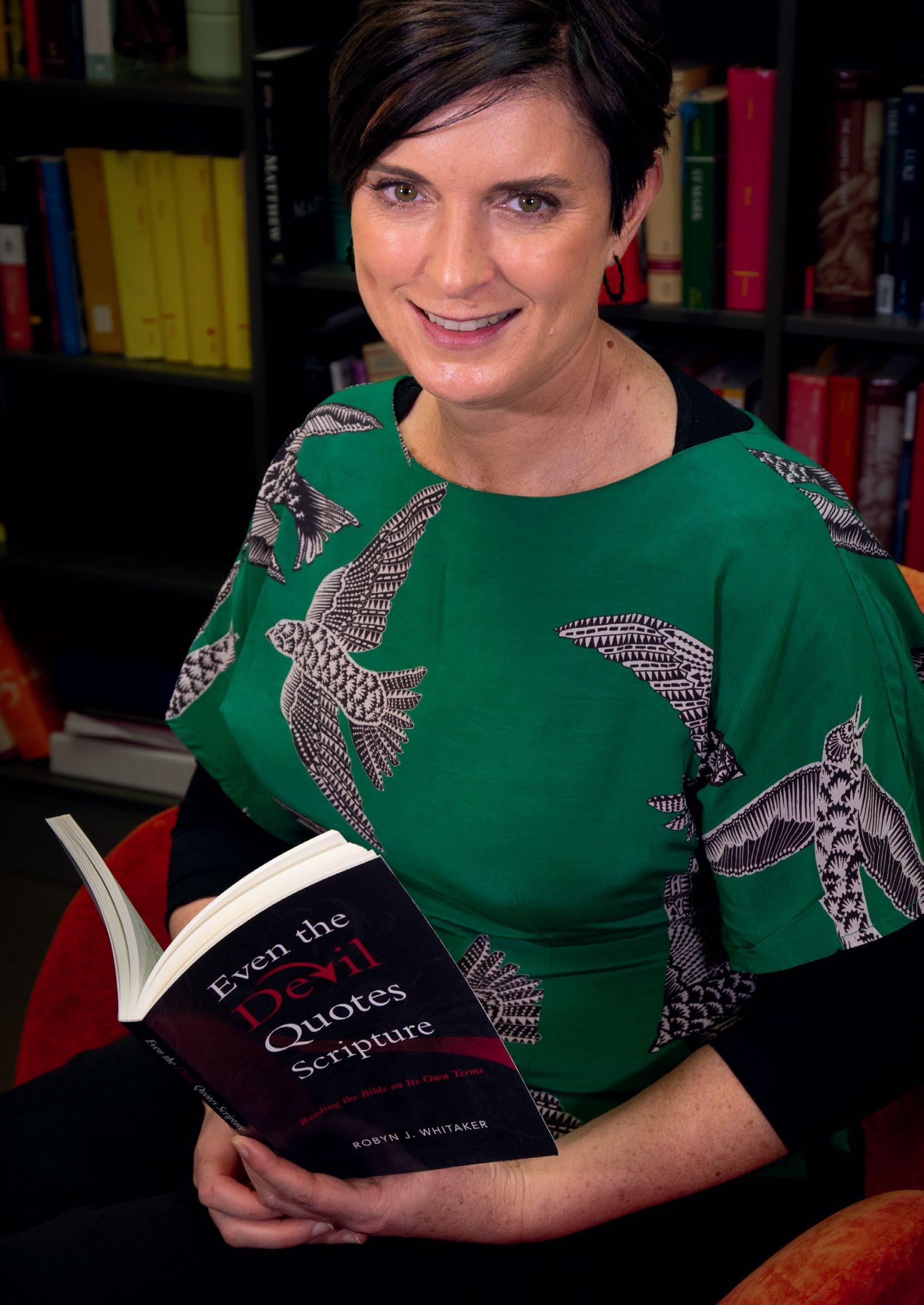 Image: Carl Rainer
Image: Carl Rainer
for several years Richmond Uniting has very generously given me two additional five-day study weeks each year, in recognition that my writing serves the wider church. This has been such a gift for completing writing projects. It is precious when congregations recognise that "their" minister also has gifts for the wider church and supports them to share these.
Robyn : I am a morning person, so the best time for me to write is the first few hours of the day before I open emails. I am not great at juggling and prefer to find blocks of time to blank out and be able to immerse myself in a writing project.
You obviously know each other well through Pilgrim Theological College and your involvement in the ‘By the Well’ podcast, so do you sometimes bounce ideas off each other during the writing process for your respective books?
Sally : We haven’t tended to bounce ideas off one another for particular writing projects or for our new books. However, it is great to discuss various aspects of New Testament studies when we co-host By the Well, as well as in other biblical and theological forums. It was a joy to be able to launch our new books together recently. It is excellent to have vibrant New Testament colleagues in the same city and denomination.
Robyn : Sally and I actually didn’t discuss these books in advance so we did not know what each other was writing. Holding a joint book launch was an idea that emerged when we realised our books were coming out at a similar time (a nice coincidence since we don’t have any control over publisher’s time lines). I do, however, bounce ideas off colleagues all the time and find that essential to any writing project.
What do you hope follows from the release of your book in terms of how readers might engage with it?
Sally : I hope that this book disrupts, enriches, and expands peoples’
understandings of early church christology. I hope that the book supports and equips people to dive deeply into questions about Jesus, divine gender, and the shape of contemporary discipleship and being church. I have written liturgies for each chapter in the book, and I hope that these are nourishing for people in their journey with the Holy One - Sacred Three, both in their faith communities and in their personal lives.
Robyn : I talk in the book about how we are invited into conversation with the Bible and with one another. Quoting Scripture is not the end of a conversation but the beginning of one, so my hope is that ‘Even the Devil Quotes Scripture’ sparks conversation between people about how they use and interpret the Bible. I have developed a resource for book discussion groups which is free on my website.
How has the feedback been from readers?

Sally : The feedback about the book has been deeply moving. People, and faith communities, have contacted me to thank me for the way in which the book has deeply spoken to them, and has expanded their theological horizons, practices of faith, and their prayer lives. Recently I was humbled that someone contacted me from the United States to let me know that they had written a song about Jesus Sophia, inspired by my book.
Robyn : So far the feedback has been really positive. One man sent me a tweet saying it was the most helpful book on biblical interpretation he has read. I have, obviously, decided to stop reading further comments now as I can’t ask for more than that.
What makes a good theological book?
Sally : For me, a good theological book engages seriously with the biblical text, with questions about the divine, and with the complexities of being human. I also think good theology is grounded in the ongoing practice of seeking to listen
16
From P14
Image: Carl Rainer
for the Spirit. The writer Thomas Merton once said that “the perfect theologian is one who is a contemplative and has an experiential realisation of the mysteries of faith rather than just a bookknowledge about God and the mysteries of faith”. I tend to agree.
Robyn : I think the best theological books are written in a way that is accessible (not too much technical language or jargon) but also challenging. Good theological books should ideally stretch our ideas, challenge our biases, discomfort us, as well as give us something hopeful to hold on to.
What is next on the writing schedule?
Sally : Right now, on my writing days I am working on a couple of academic articles about church theology, both in ancient and contemporary contexts. I have also begun collating some of the liturgies that I have written for both personal and corporate prayer. I am excited about diving into my next big writing project, focused on the texture of Christian hope in the middle of the messiness of life.
Robyn : I’m currently writing Revelation for Normal People for the Bible for Normal People group. People might know them from their podcast with the same name. It is a small book designed to bring scholarship about Revelation to people in a readable and accessible way.
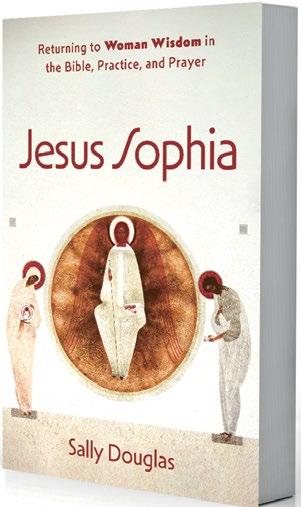
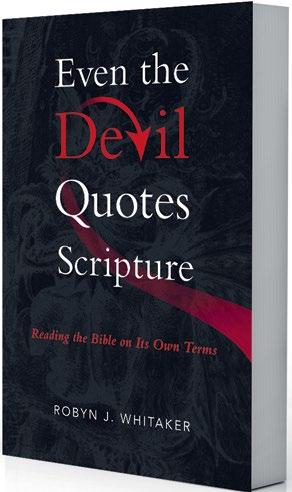
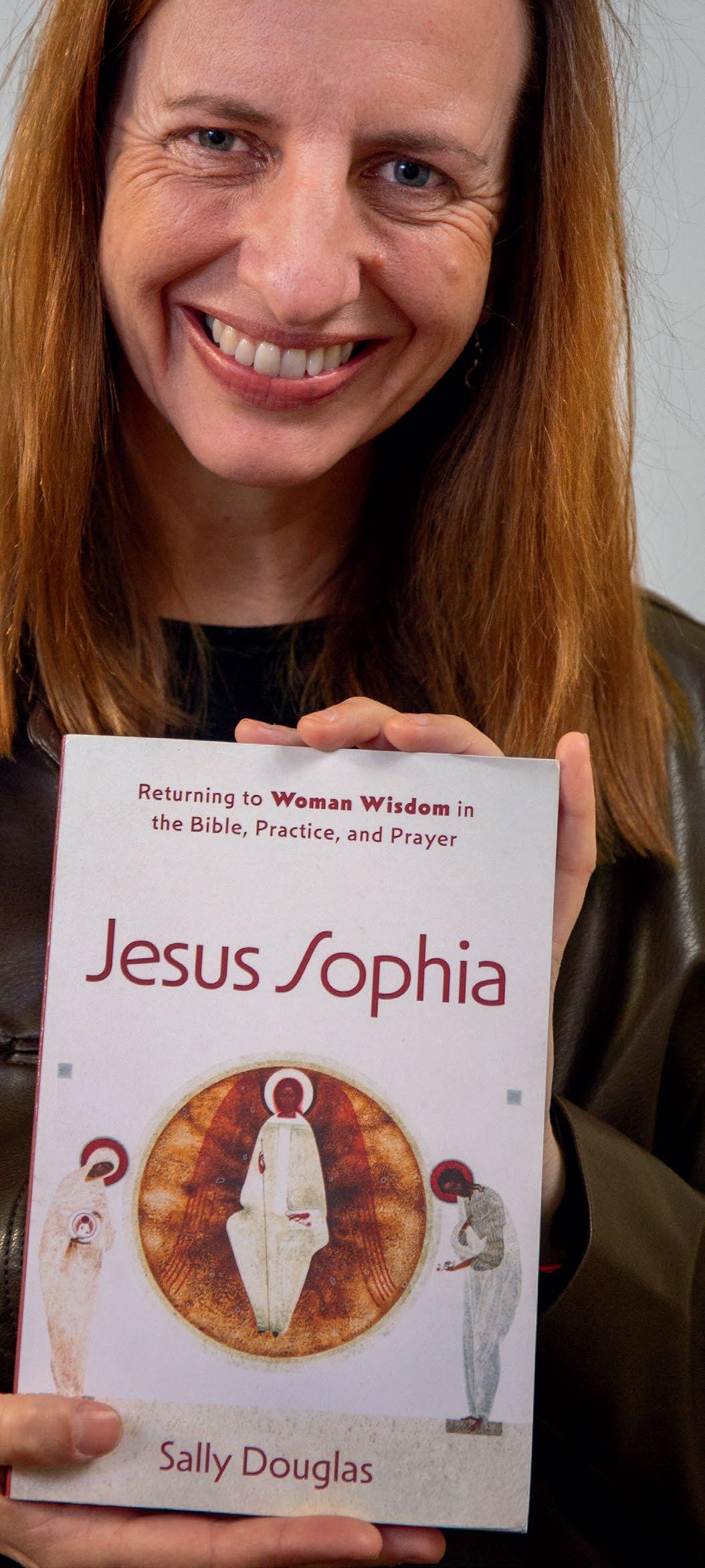
17
Making a
difference
By Cathy Withiel
Dogs are wonderful companions, but they don’t understand cricket. And they don’t get that being out for a duck is not the same as trying to chase one in the park.
So during the cricket season, Uniting AgeWell Social Connections volunteer Pat Kennedy knew the moment she said “hello” to the older client she phoned every fortnight, she’d be regaled with the innings of the latest match.
“She lived alone and used to spend her evenings cuddled up in bed with her dog watching Australia take on England during The Ashes,” Pat explains. “And she couldn’t wait to tell me all about the game. We became great friends.”
Pat has been a volunteer since she retired seven years ago and gets huge
joy in making a difference to the lives of lonely older people. “We talk about all sorts of things,” Pat says. “The coronation, the weather, our experiences … it’s wonderful to hear their stories and to be a part of their lives.”
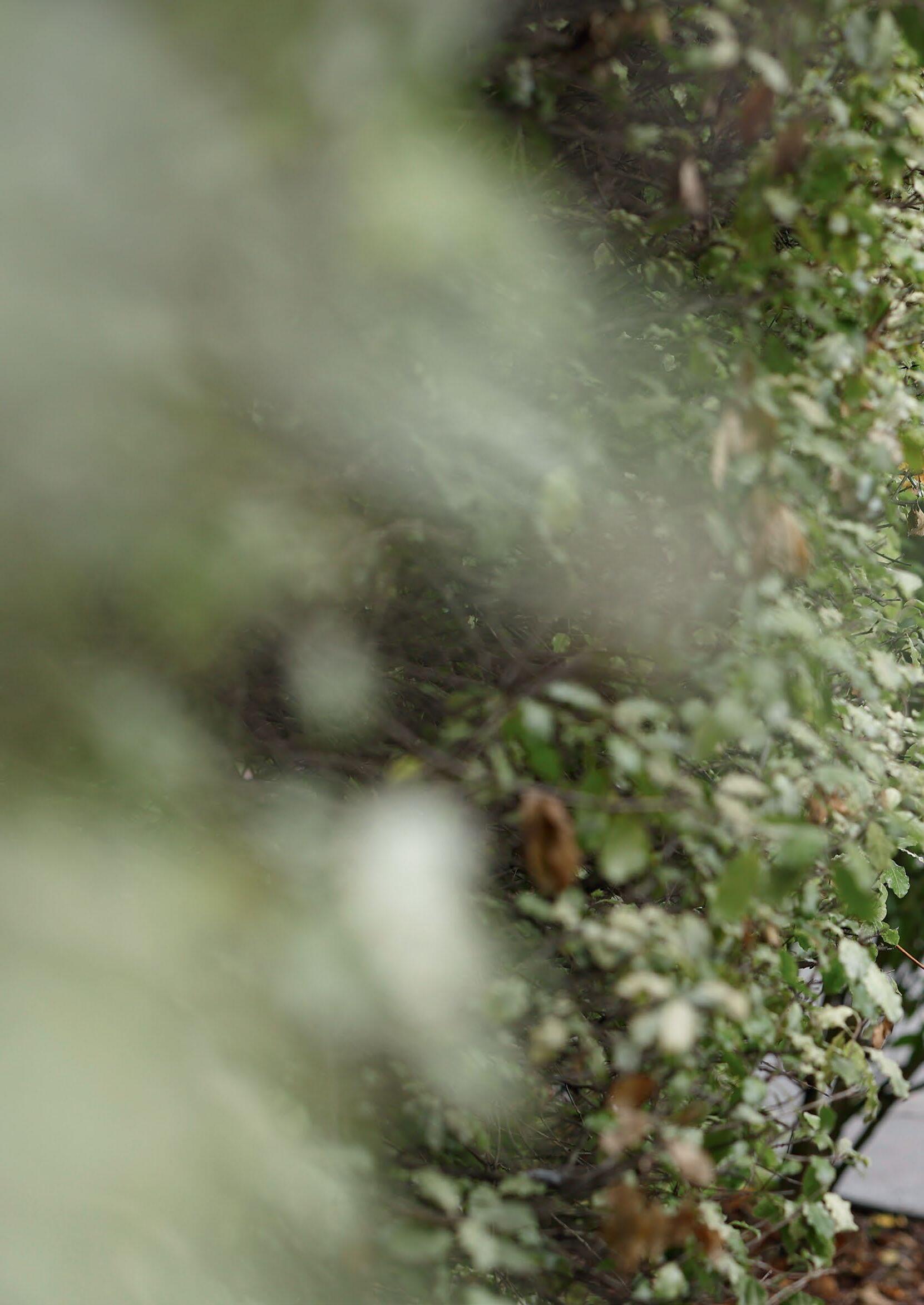
And Pat says she sees first-hand the terrible emptiness that loneliness can cause. “I visited another client who lived in a backyard granny flat. Sometimes I was the only person she saw all week. At the end of each visit, she’d hug me goodbye.”
Actions often say what words can’t and Pat finds it’s the little things she does in the one-on-one visits that make all the difference. “We go and have a coffee at a café, or browse through the shops. We’ll share family photos, play a game of
cards and have a laugh. Having fun is so important.”
Pat says volunteering not only provides purpose but also fills the deep need in her to help others. “I’ve been very blessed,” she says. “I’ve been married nearly 50 years, we’ve got two kids and three grandchildren and I’ve had a busy happy life. I want to give back.”
This is just one of the many heartwarming stories to emerge at one of the lunches, brunches and morning teas Uniting AgeWell held during National Volunteer Week from May 15-21 to thank its volunteers for enriching the lives of older people.
The theme for this year was The Change Makers which celebrates the
Continued P20 18
Stan Roberts loves helping out as a volunteer at Uniting AgeWell Kalkee Community Nangatta.
difference
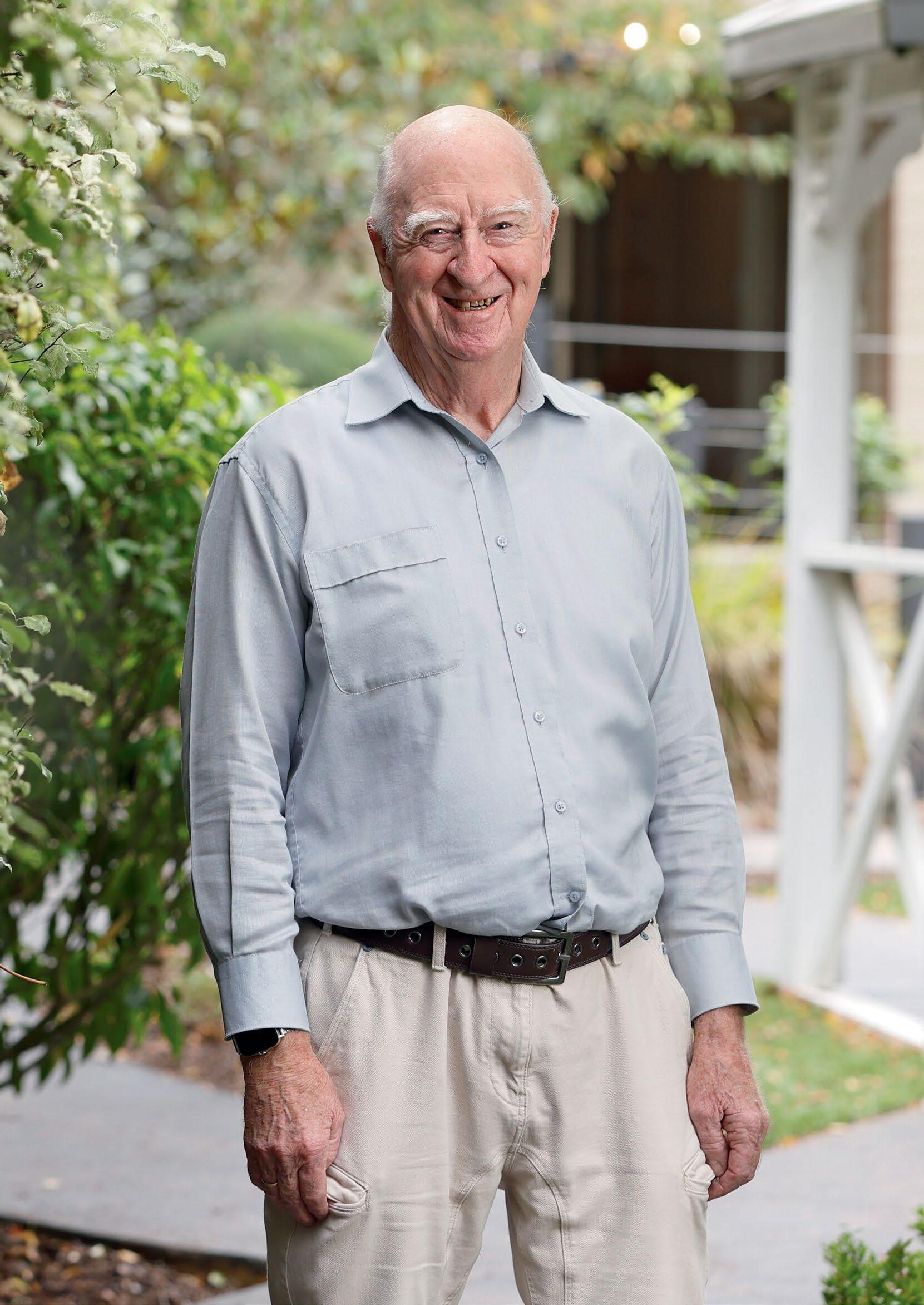
power to drive change and ensure volunteering is inclusive of all members of the Australian community. Uniting AgeWell CEO Andrew Kinnersly says, “this theme rings true for us, where inclusion is a core value underpinning everything we do. With a long history of volunteer support, Uniting AgeWell’s services have grown and flourished; a vital contribution we recognise and appreciate each and every day”.
Born from congregational life
Uniting AgeWell’s services stem from the pews of Uniting Church congregations across Victoria and Tasmania. For over 60 years, Uniting Church congregations proved that actions speak louder than words by providing care and support services to older members of their communities.
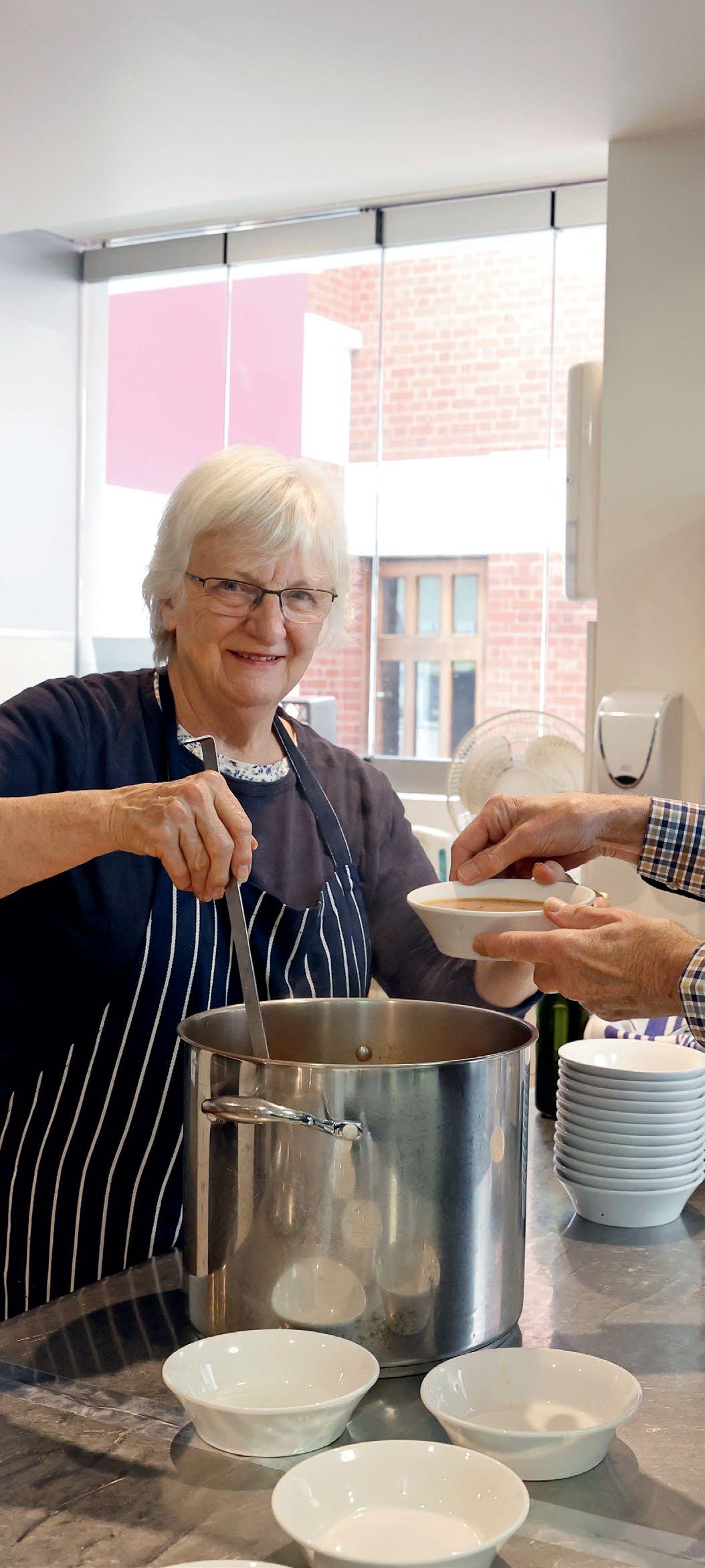
It wasn’t just the care itself – it was all the work behind it, too. Members of multiple congregations rolled up their sleeves and lobbied government for finance, encouraged and managed bequests of land and money, garnered local community support and managed fundraising campaigns for residential care facilities.
And it is the work of these dedicated volunteers that has served as the foundation for all Uniting AgeWell’s services today, that reach tens of thousands of people each year.
The landscape changed in 1997 when the Federal Government determined the aged care sector should be closely regulated and brought in the Aged Care Act. The rest is history. For some years following this change, Uniting Church aged care services were managed by local boards and CEOs until they were brought together as one organisation, Uniting Aged Care in 2004, which was renamed Uniting AgeWell in 2013. What hasn’t changed though, is there’s still a huge need for volunteers.
Back in full swing
The social isolation caused by the long lockdowns during the COVID pandemic has had widespread effects.
And one of the areas to suffer was faceto-face volunteering in aged care, which largely ground to a halt. While telephone
20
From P18
Joy and Graeme Thompson work in the kitchen at Uniting AgeWell’s Social Connections Centre, Linlithgow in Ivanhoe.
and video-link volunteering continued, it became increasingly clear there’s no substitute for a hug or going out to a café to connect with the community.
Older people and volunteers alike suffered. Statistics from the Australian institute of Health and Welfare make grim reading. In October 2020, before the second COVID lockdown was lifted, Victorians were more than twice as likely to report feeling loneliness than other Australians in other states.
These bleak days are behind us – and now more than ever it’s time to join Uniting AgeWell’s 500-plus group of volunteers who are back in full swing and determined to make up for lost time.
The Australian Government’s Department of Health ‘Healthdirect’ says volunteering provides many benefits, including creating a sense of achievement and purpose and helping you feel part of the community.
It enables you to share your talents, learn new skills and creates a better work-life balance. And socially it helps combat stress, loneliness and depression – with the added benefit of meeting new people which can help you feel more connected and valued.
Uniting AgeWell’s volunteers know first-hand that volunteering not only enriches the lives of older people, but their own. And this is not textbook knowledge. It’s lived experience.
And there are other benefits to add in to the mix, for example those who volunteer their time to take part in the many research projects that Uniting AgeWell undertakes to improve the quality of life and services for older people. Some even find that volunteering opens career pathways within the organisation. This makes sense. One of the pre-requisites for working at Uniting AgeWell is kindness, and you have to be a kind person to volunteer!
The importance of purpose
Volunteering is not only deeply rewarding, but it can help fill the lonely void sometimes felt in retirement. Or when a partner passes away, or when someone finds themselves living apart from their loved one who has moved into
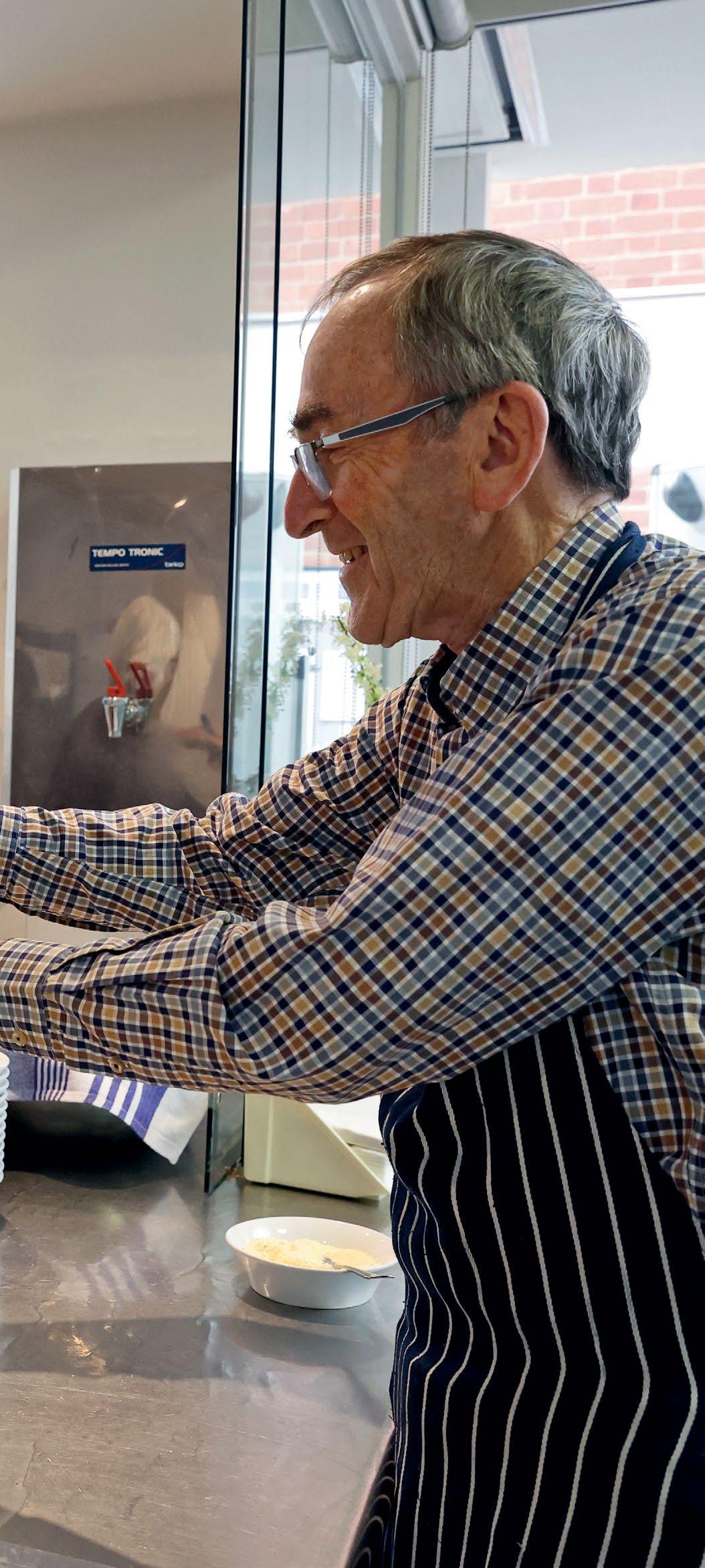
21
Continued P22
residential care. When Merv Stanton’s late wife, Margaret moved into the Queenborough Rise Community in Sandy Bay over a decade ago, she looked out her bedroom window and said, “The garden is beautifully green, but there’s no colour”.
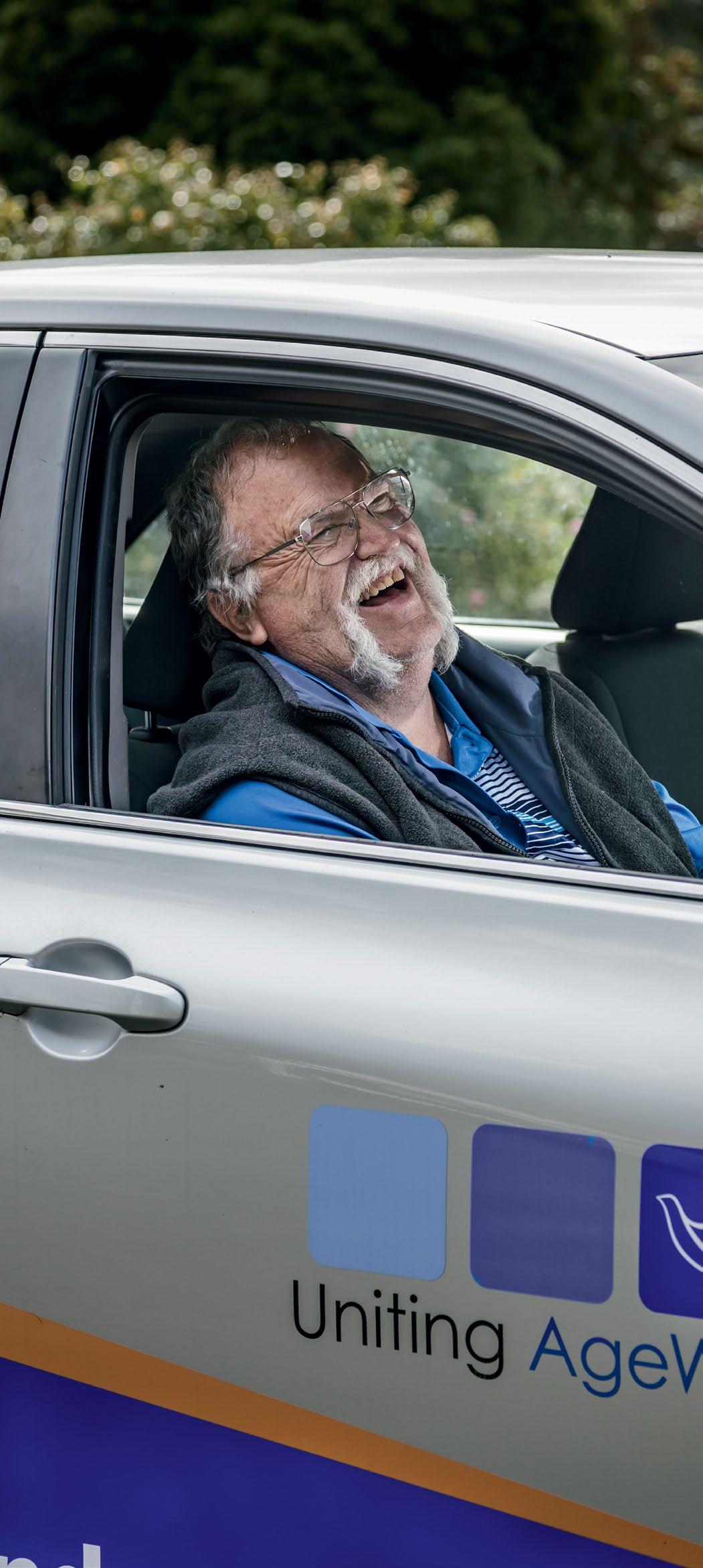
So Merv promptly set about bringing in vibrant plants from the garden at their home and planting them outside Margaret’s window. “Margaret loved looking out at the bright bursts of colour,” Merv says. “It made her very happy.”
Working in the garden made Merv happy, too. He became a volunteer –and at 96 he’s still there! Not only is he busy in the garden, but over the years he’s called Bingo, gone on bus trips with residents, helped set up the Garden Club and looked after the library. He still prepares the quiz every fortnight.
“The more you give as a volunteer, the more you receive,” the retired Anglican Minister says. “I have gained so much personally through helping others. It’s wonderful.”
Then there’s Stan Roberts whose world has revolved around his wife, Dorothy, for the past 28 years they have been married.
Two years ago, she moved into Uniting AgeWell Kalkee Community Nangatta when her dementia worsened. And now that he’s living in an independent unit on his own, Stan’s world still revolves around her. Only in her new home.
As well as visiting Dorothy, he’s taken up volunteering there two days a week: helping staff during busy meal times and being involved with activities for residents. The 80-year-old even brings along the saxophone he’s been playing since he was a teenager, and performs old favourites for everyone.
Stan says volunteering adds purpose to his days. “It is a privilege to spend time with people and know that I am bringing joy to their day and making a difference,” he says.
Different-but the same
What is clear is there is no one-size-fitsall when it comes to volunteers who are as diverse as the older people they
22
Jamie Bessell is a volunteer driver at Grampians Community Transport. From
P21
spend time with. What unites them is their kindness and their desire to help others.
A gathering of Berwick-based volunteers that hosted a thank-you brunch by Uniting AgeWell at a local café recently provided a snapshot of the many different cultures and ages of volunteers, ranging from students as young as 19 to people in their 70s. And as the laughter and chatter rose and the coffee cups emptied, the group swapped stories and shared their joy in creating joy in the lives of others.
They are all part of Uniting AgeWell’s Social Connections Program funded through the Government’s Commonwealth Home Support Program, where they are matched with clients who need support to connect with their community, interests or services.
One of those is Bachelor of Science student Tanycia Munasinghe, 21, who has a Sri Lankan background and who visits a 75-year-old client. “I love spending time with her,” Tanycia says. While Raheed Bostan, 19, a Commerce and Law student at Monash University says, “My grandmother is in my homeland of Pakistan and spending oneon-one time with older people is almost a way to connect to her”.
Volunteers have different interests, too. And with the vast range of volunteering opportunities available, there’s something for everyone.
Rachel Martin, Uniting AgeWell Team Leader Social Connections says there are many options to choose from:
One-on-one visiting: spending time with people at home – playing board games or listening to music or chatting. Or out in the community and supporting them to get back to the things they enjoy socially –visiting op-shops or cafes, galleries or places of interest, or going out to lunch.
Chat-A-Ring: chatting one-on-one with people on weekly or fortnightly calls.
Telelink: group chats with up to six-eight people who dial in. Topics
can include armchair travel, quizzes or just chatting! This is particularly beneficial for people with social anxiety or those who are visionimpaired.
Outings – taking people out for meals or to the movies, or other outings established around people’s needs and preferences.
Retired Ringwood social worker Ken Rosenhain volunteers with the Social Connections Program and takes a group of older men to lunch every fortnight. Ken says they are all single, with some of them widowed and many aged 70 or older. He and another volunteer transport them from their homes and take them to a Ringwood restaurant, and then drive them home after lunch.
“We talk about sport and current affairs, and then when everyone is relaxed, the conversation sometimes gets into how they’re coping and how they’re feeling,” Ken explains. Ken says his experience is that men can be reluctant to open up to how they are really feeling. “Some of them can be really lonely when they find themselves single again after all these years,” Ken explains. “They think they will cope, but some of them don’t. They’re really isolated.”
Drive to help out
If you live in country Victoria and going out to cafes or visiting people in their homes isn’t your thing, you can be like former limousine chauffeur Jamie Bessell, who is right on track when it comes to giving back to the community.
He’s loving volunteering at Grampians Community Transport, which provides local transport for older people in Ararat or Ballarat, with trips made further afield for medical appointments. Jamie is one of the volunteers who delivers the Uniting AgeWell community transport service in the region, which has a fleet of six cars and a bus. And Jamie, 65, says volunteering keeps him on top of his game during retirement. “I enjoy driving people to doctors’ appointments or social outings,” he says, “and it’s great to chat to them”.

23
Continued P24
Centres of joy
Some volunteers work in many of our community centres, like Joy and Graeme Thompson who love spending their days ladling out hot meals – and happiness.
Recently they served soup and lasagna for an Italian-themed meal for older people at Uniting AgeWell’s Social Connections Centre, Linlithgow in Ivanhoe. And they are thoroughly enjoying helping staff organise dancing, light exercises, bocce, balloon tennis, card games, arts and crafts and more.
The couple has been volunteering at the centre for the past five years following a call out for volunteers by the Uniting Church they attend. Graeme has
Bringing your heart to their home
Volunteering opportunities are as varied and diverse as the volunteers themselves. Like Sue O’Donohoe, who brings her therapy dogs to visit Strathdon Community residents. The Bernese Mountain pups have certainly wagged their tails into their hearts and Sue confesses she even dresses them up for special occasions. Nothing hound couture – just bunny ears for Easter and antlers and tinsel for Christmas! Sue enjoys it too; she says there's something hugely rewarding about volunteering.
Many volunteers spend time regularly visiting individual residents, others
held significant volunteer roles within the church all his life, including being chairperson of the congregation, so when he heard the call to action he was delighted to step forward.
“There’s so much to get out of volunteering. It’s very rewarding,” Graeme says. “The participants love being here at the centre. They share a great bond, and there’s lots of affection.”
The couple finds their own particular interests resonate well with the older participants: Joy loves flower arranging and Graeme enjoys sharing presentations of his holidays, like his journey to the Nullarbor.
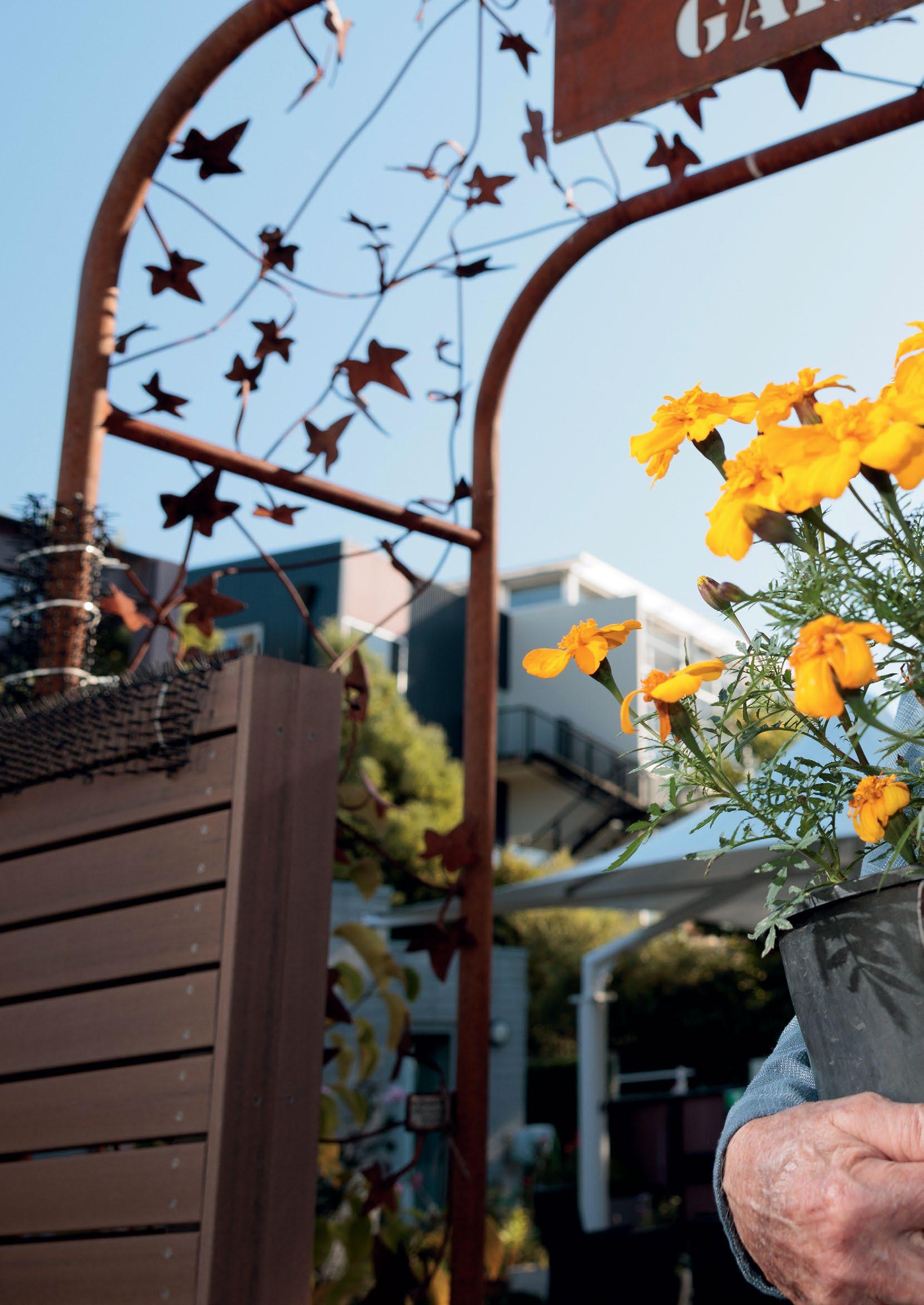
help the lifestyle team with activities and outings. And there are volunteers who help write residents’ life stories, a particularly rewarding experience for all involved, with residents enjoying the chance to reflect on their lives, tell their story and leave a written legacy for their families.
If you have a big heart and a little bit of spare time on your hands, you may like to consider enriching the lives of others – and your own – by becoming a volunteer. Uniting AgeWell would love to hear from you! Call 13 93 75 or visit www.unitingagewell.org/getinvolved/volunteering
From P23 24
"It is a privilege to spend time with people and know that I am bringing joy to their day and making a difference."
Stan Roberts
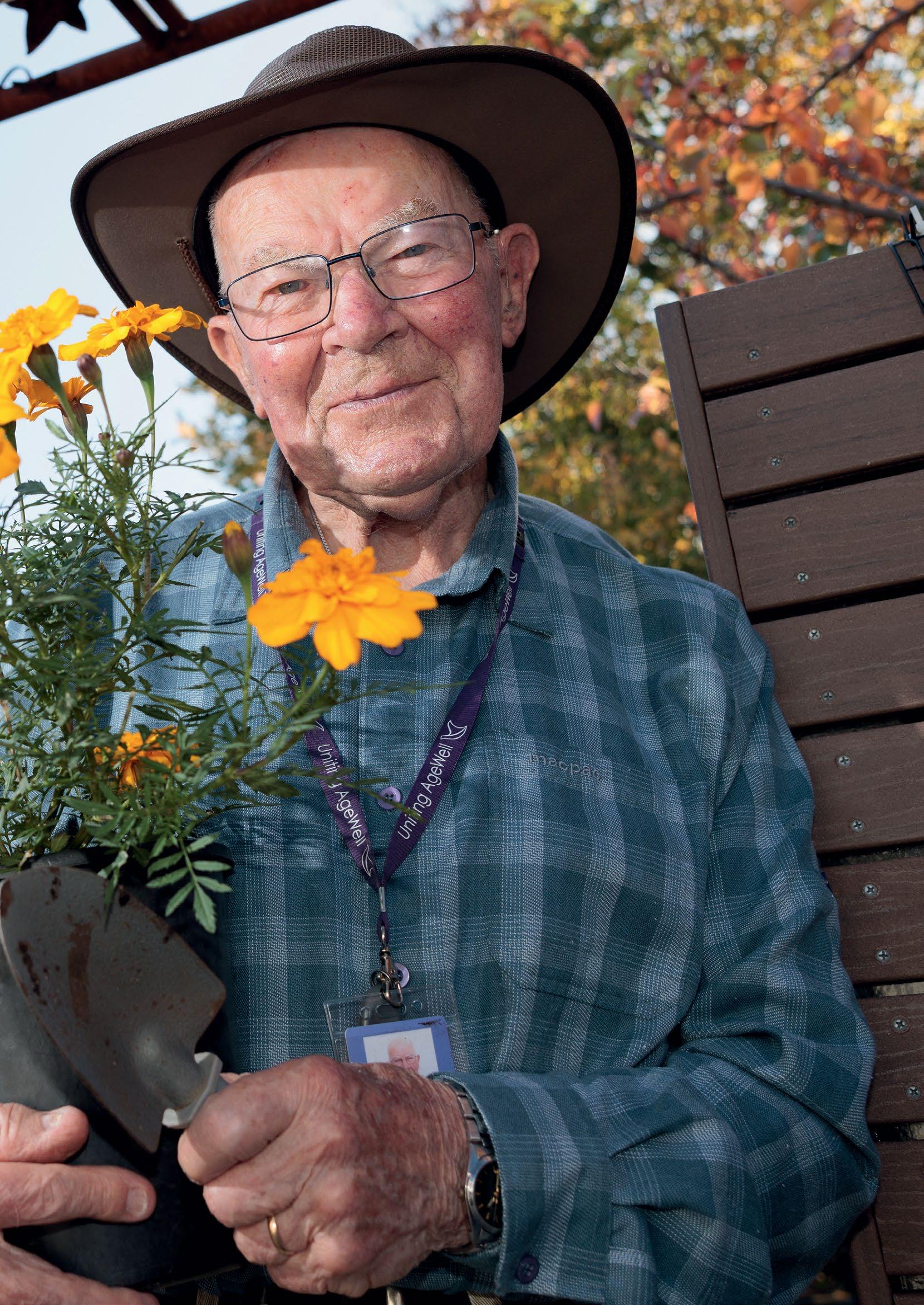 Merv Stanton is a keen gardener at the Queenborough Rise Community in Sandy Bay.
Merv Stanton is a keen gardener at the Queenborough Rise Community in Sandy Bay.
Share God’s love through the Christmas Bowl so refugees are not forgotten
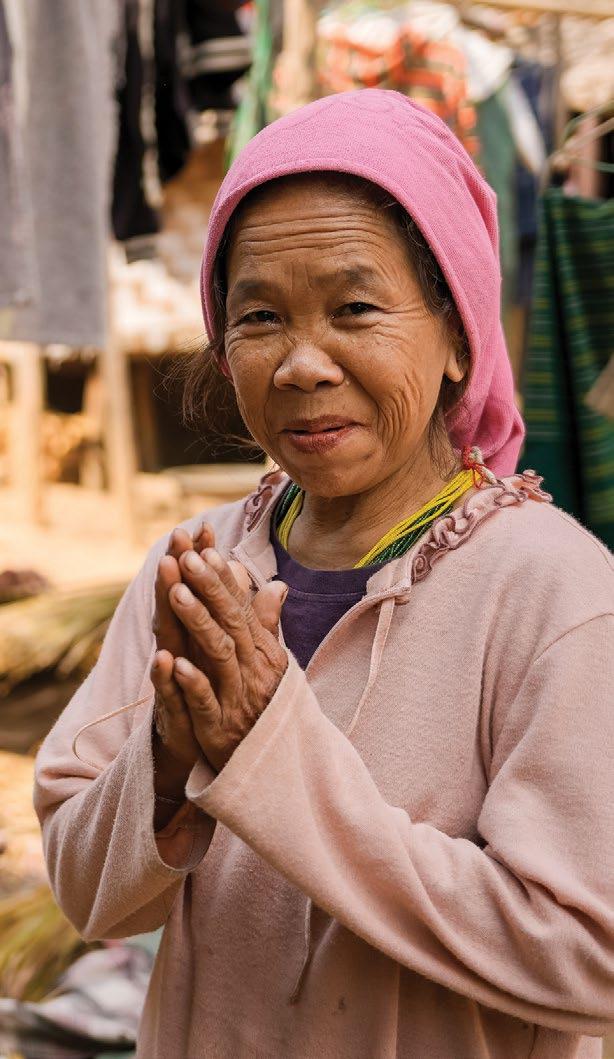
Refugees fleeing conflict in Myanmar are living in camps on the Thai-Burma border, hoping that one day it will be safe for them to return home. Thousands of families continue to flee the country, but with this emergency no longer in the headlines, many fear they will be forgotten. At a time when more people than ever are forced to flee their homes, lifesaving aid is being stretched too thin, leaving many refugees at breaking-point without the support they need to survive.
Please give

Give Hope
Food For Families.
Put food on the table - all year round.
Everyday we dig deeper to provide support when people need it most. We want to support everyone who reaches out to us, no matter what time of year it is - but we can’t do it alone.
Here’s how you can get involved in Food For Families:
• donate non-perishable food and essential items
• host a collection drive

• be a community drop off point for donations
• make a donation to directly support vulnerable people needing access to food.

26 Uniting is the community services
and
organisation of the Uniting Church in Victoria
Tasmania.
Call us 1800 668 426 Visit foodforfamilies.org.au Sharni Boyall Act for Peace The Christmas Bowl is the Christmas appeal of Act for Peace, the international aid agency of the National Council of Churches in Australia. ABN 86 619 970 188 Please give today to provide food, medical care, and lifesaving support to refugees. Visit afp.org.au/christmasbowl, call us on 1800 025 101 or scan the QR code.
today
Your gift through the Christmas Bowl can help our local partners provide practical care so refugees and people who have been displaced can live in safety and dignity and know that they are loved and not forgotten. move
movemove Mat’s on the move foragreat cause
When Rev Mat Harry tackles the Melbourne Marathon this month, he will be running for a very worthy initiative.
The New and Renewing Communities Catalyst with equipping Leadership for Mission in Parkville will be lacing up his runners on October 15 thanks to assistance from Uniting Vic.Tas.
While Mat missed out initially on gaining entry into the marathon, Uniting was happy for him to use a spot they had available if he was willing to combine it with fundraising for them.
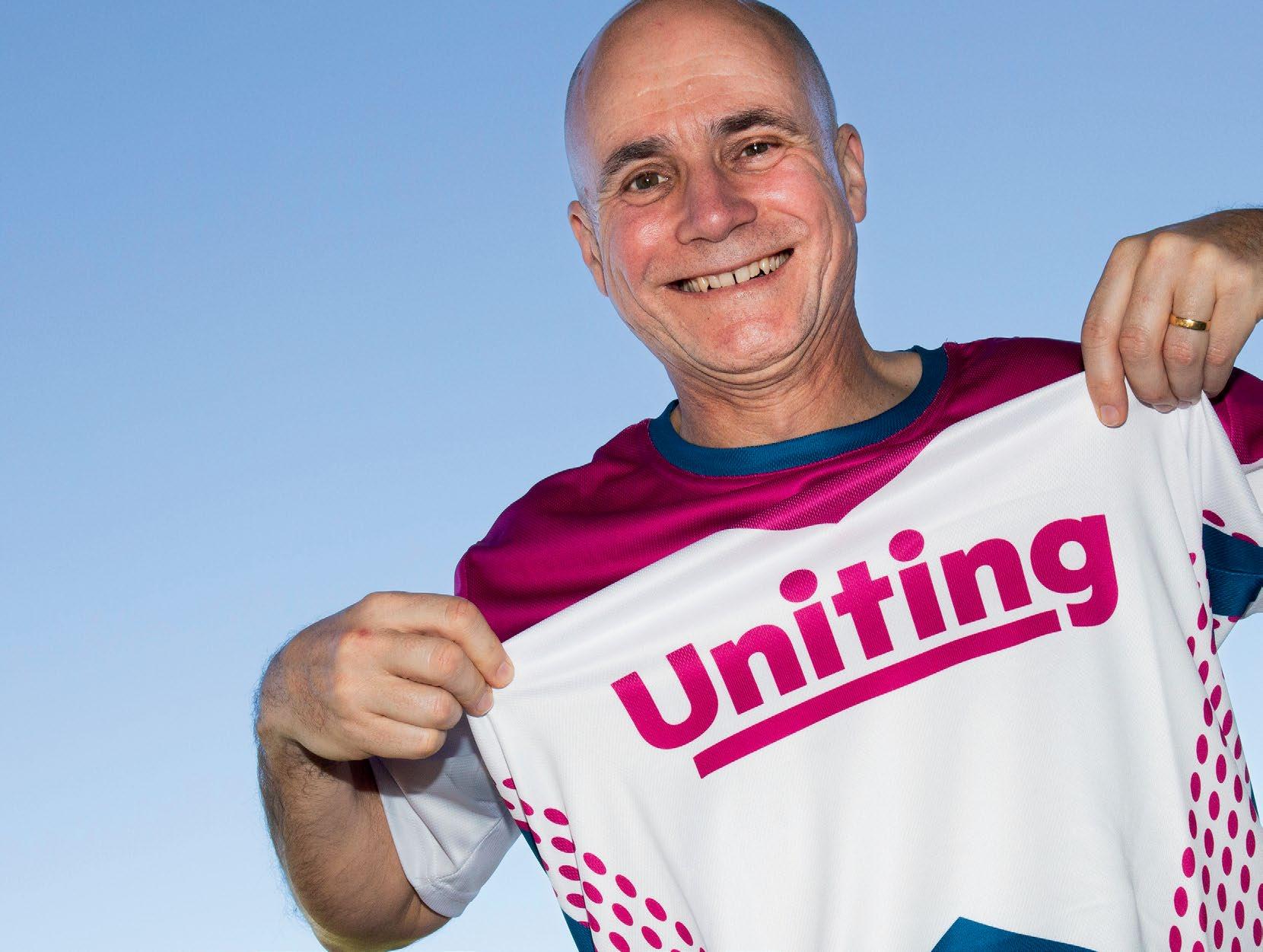
He was only too happy to oblige, so money raised will go towards Uniting’s Street to Home pilot program in the Wimmera, which helps people who are sleeping rough.
Uniting successfully rolled out the pilot program earlier this year, and outreach worker Glenn Kimberley has already helped more than 70 rough sleepers, aged from six to 69.
They include a single parent with four children living in a tent by a lake, a couple in their early 20s sleeping in their car in central Horsham, and a middleaged woman living in a tent on her own in a national park.
“The people I work with are often so embarrassed about rough sleeping that they live each day trying not to be seen,” Glenn says.
“It can be a real challenge to get that initial engagement, and sometimes it takes days, other times it takes months, but it’s all about building that trust in the relationship.”
Church and community groups responded generously during the pilot program, donating warm clothes, sleeping bags and blankets, as well as making financial contributions.
An application has also been lodged for funding and expansion of the program, replicating the Ballarat Street to Home program which Uniting delivers across the Central Highlands.
Mat says a recent trip out to the Wimmera and lunch with Glenn left him determined to help in any way he could, in his case through raising funds while tackling the Melbourne Marathon.
Mat says Glenn is doing a power of work in helping rough sleepers in the Wimmera.
“As an outreach worker for the pilot project, Glenn’s role is to seek out these
rough sleepers, offer material aid to keep them safe and warm with sleeping bags, tents, swags and food, while also linking them to healthcare, mental health support, and drug and alcohol support,” Mat says.
“By providing this in-person support, people sleeping rough aren't left alone while they wait for housing, instead remaining in contact with services even if it's for a chat, a coffee or some food.
“After only nine months, the number of people Glenn supports within the regional centres and smaller towns has surpassed 70, and that is 70 people with feelings, hurts, pains, desires and hopes like ours but who find themselves without safe accommodation.”
Mat has been clocking up the kilometres in training ahead of his date with the 42km Melbourne Marathon course, and he can’t wait to tackle it in support of such a wonderful cause.
He hopes Uniting Church members in Victoria and Tasmania will get behind him and support those doing it tough in the Wimmera.
To make a donation, go to Mat’s fundraising page at t.ly/SJNMf
27
Image: Carl Rainer
Drawn to historic churches
By Frank Porter
In 1946, a then nine-year-old Bruce Fraser began what would be a life-long association with St David’s in Albury. He didn’t know it at the time, but many years later, St David’s would be the beginning of an artistic project that would capture the UCA’s rich history on both sides of the NSW-Victoria border.
“I first became associated with St David’s (Presbyterian) as a boy when my family moved to Albury after my father

was discharged from the RAAF in 1946,” Bruce says.

“He spent all his teaching career at Albury High School. I followed what was the normal stages of church life, junior church, PFA, property committee.

“On returning to Albury some years later, having worked with councils in Sydney and Fiji, I became more involved in property matters, became secretary of the church council and presbytery
representative. I was also chair of several committees building aged care facilities and I drew my first church (St David’s), which was used on the offering envelopes.”
That church would be the first of 99 in the North East Presbytery that Bruce would end up drawing in retirement. And his sketches have become a priceless prism into the church’s history in rural Victoria and NSW.
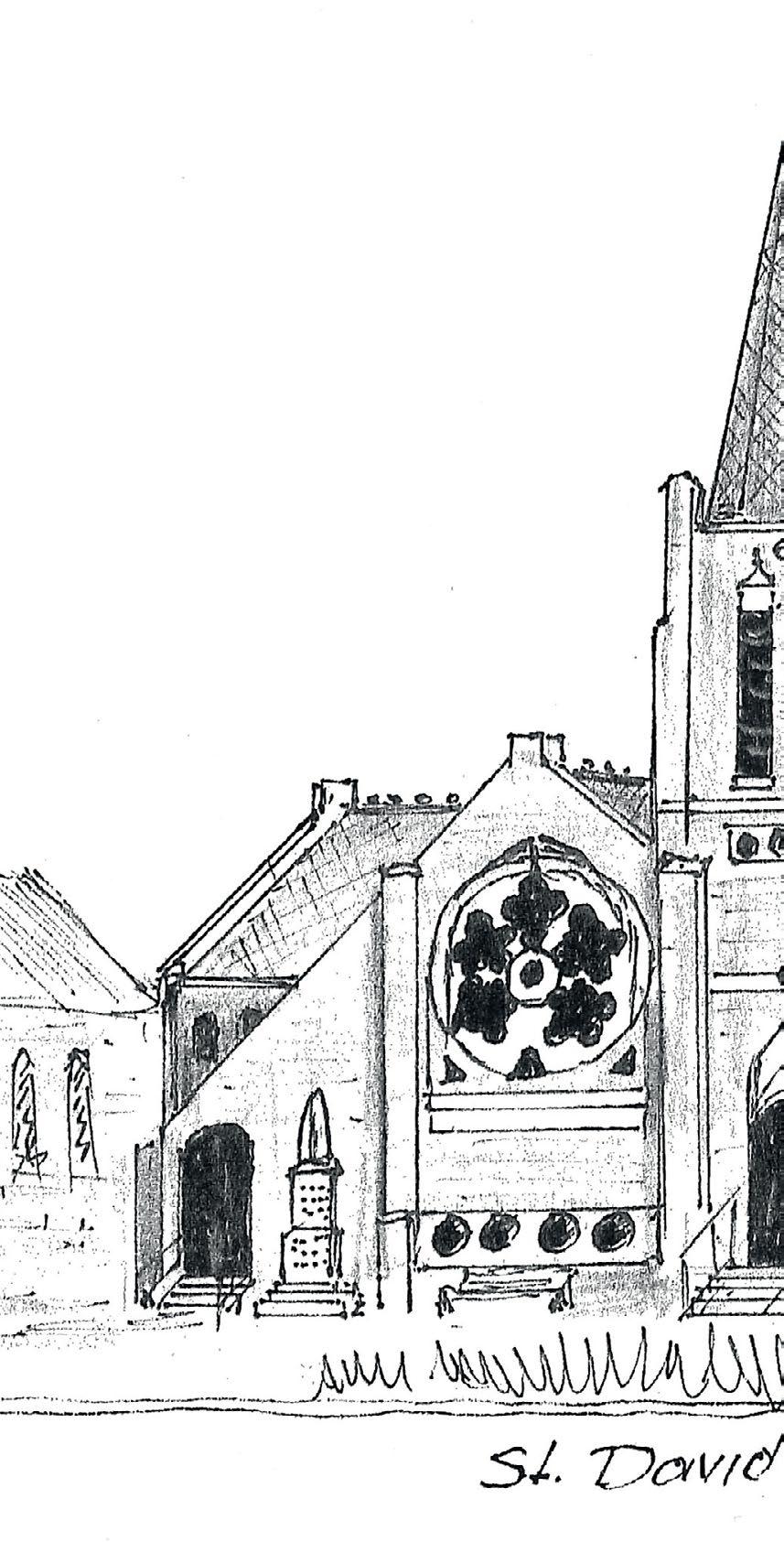
28
“The North East Presbytery covers several geographic types of country,” Bruce says.
“It is divided approximately by a line from Albury-Wodonga through Wangaratta, Benalla and Euroa.
“The land to the east of this line starts with low hills and steadily flowing watercourses, but further east the hills become higher and heavily timbered and the streams flow vigorously until
one reached the foothills of the Great Dividing Range.
“Early settlers in this high rainfall environment had it tough and settlement was mainly on the rich soils adjoining the rivers. Churches were few as these early farmers were mainly selfsufficient.
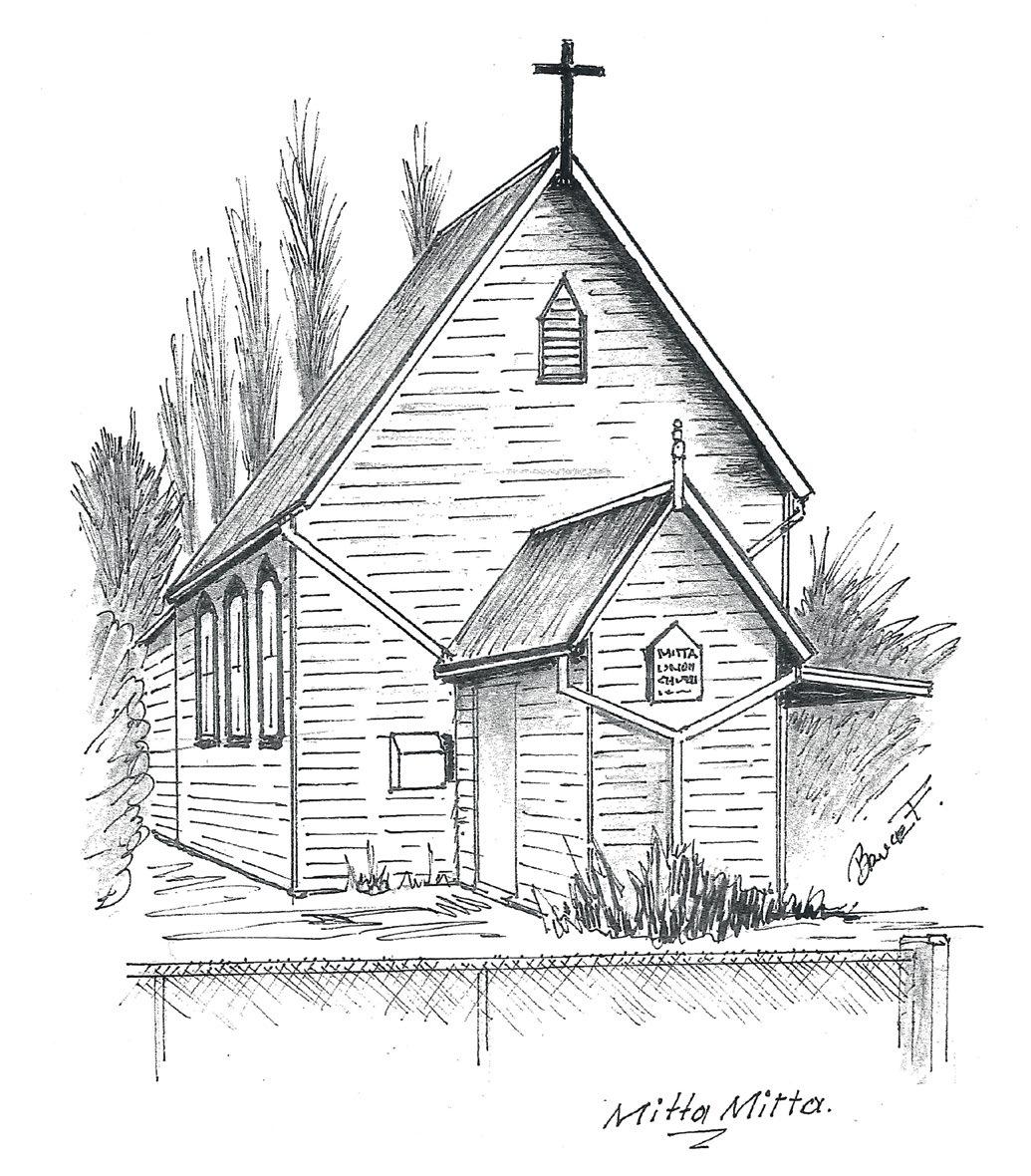
“When gold was discovered at Ballarat the ‘gold rush’ began and this led to a huge influx of miners and other town
people and, before long, towns such as Beechworth, Corryong, Myrtleford had public buildings, schools, hotels and churches of a substantial nature, most still standing.
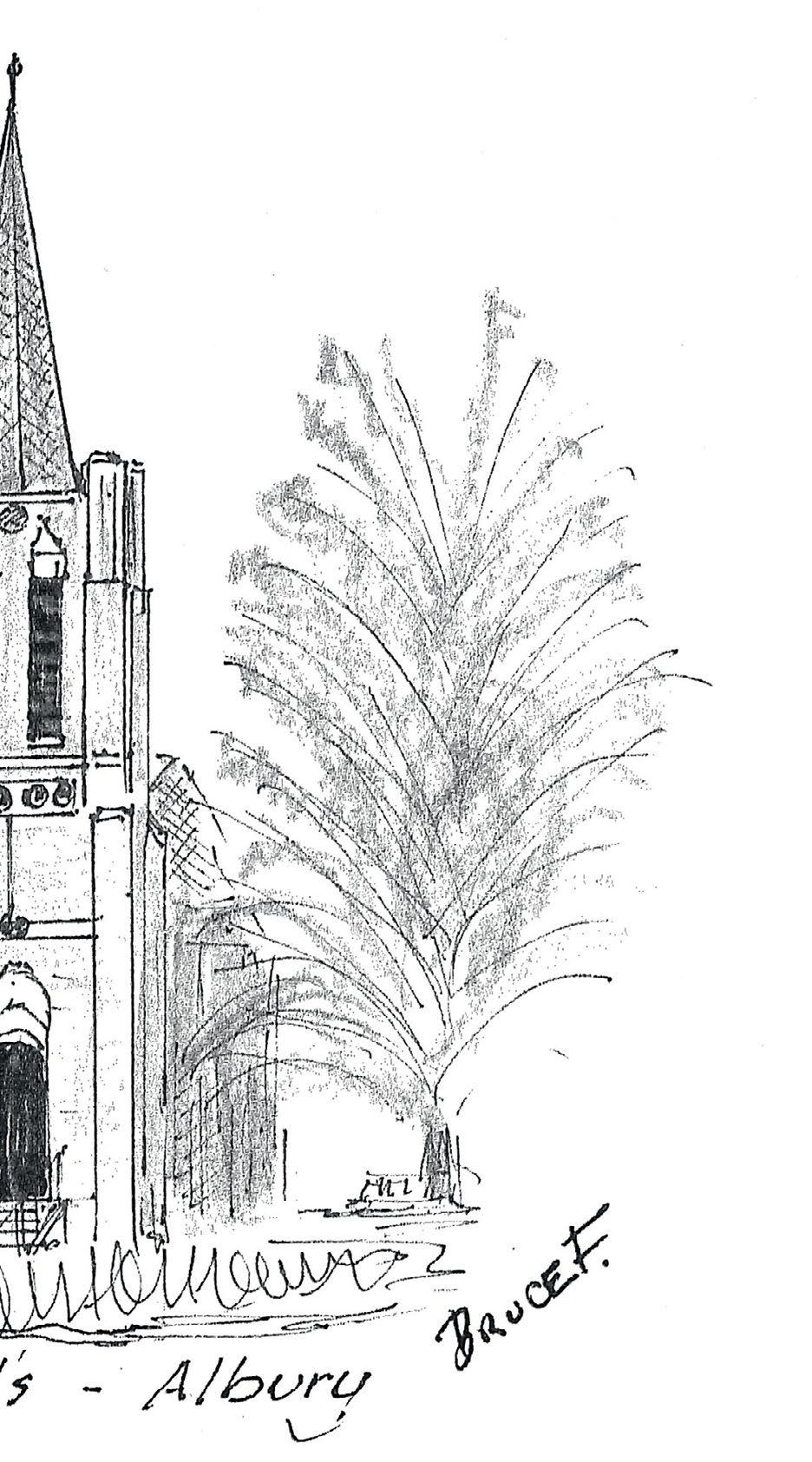
“Following WWI, the Victorian Government took over most of the western area comprising large dry country ‘runs’ and subdivided it into small Soldier Settlement blocks.
“The ex-soldiers, who often had little
Continued P30 29
or no farming experience found this hard going until irrigation schemes provided a reliable water supply.
“Many small local churches were built, mostly from local timber, but many have disappeared.
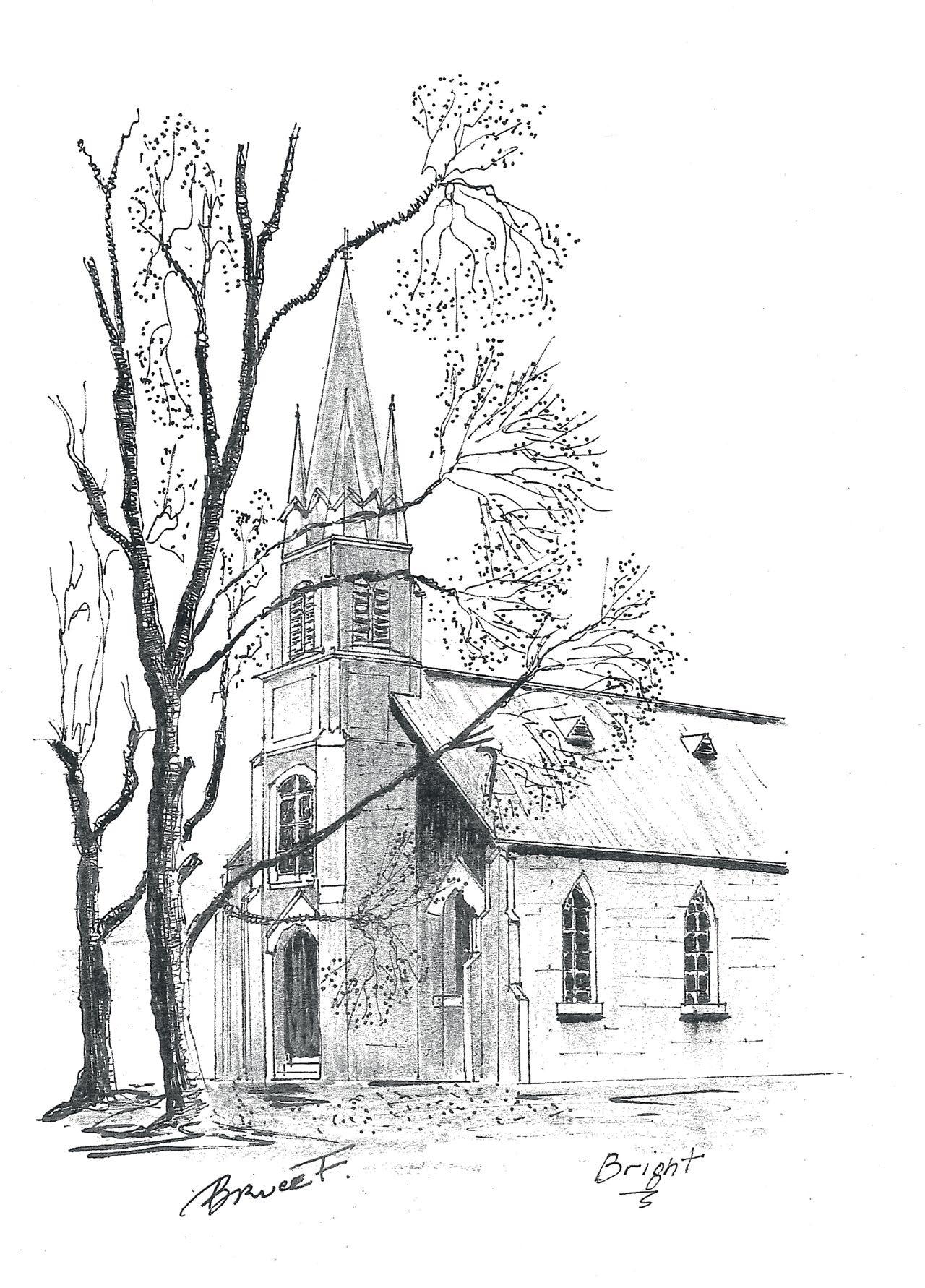
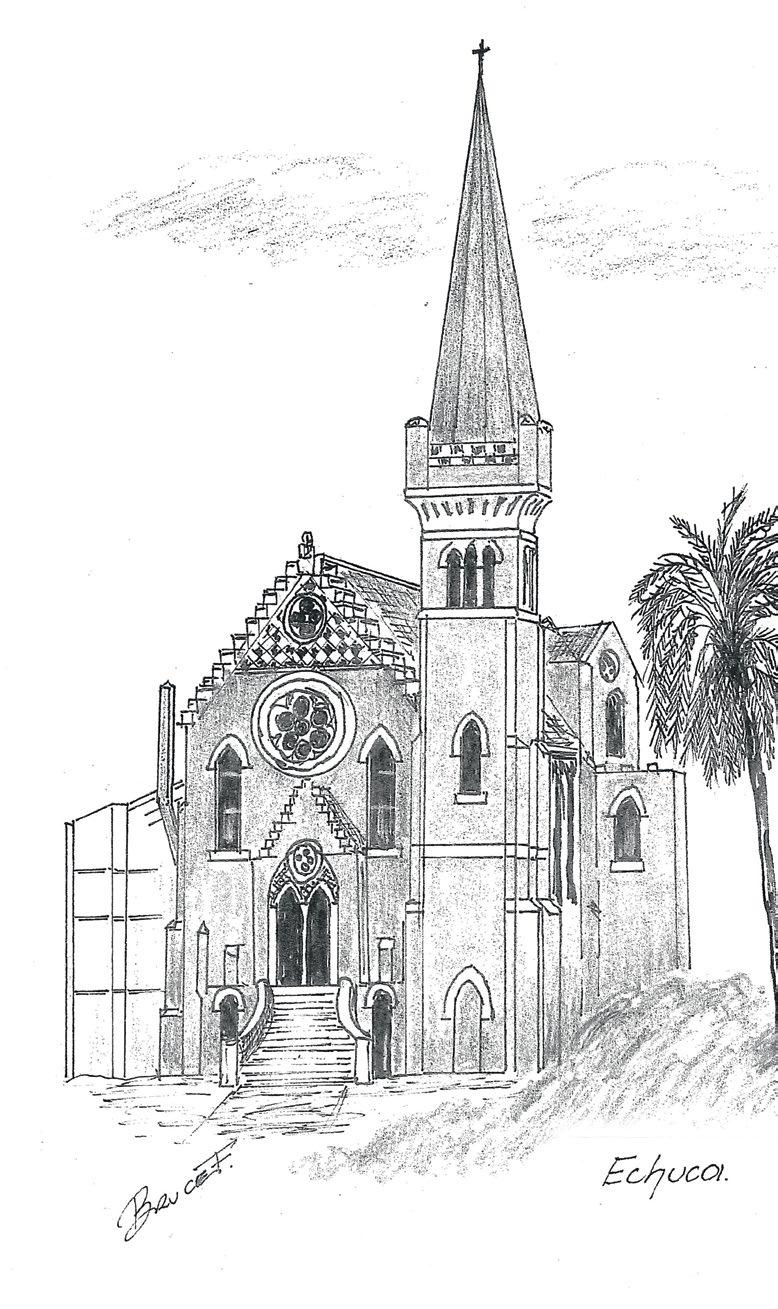
“The remaining ones joined the Uniting Church, some still standing, being a preaching place for the nearest town.
“Others have been sold or moved as
changing social life and the motor car have made them redundant.”

Bruce spent most of his early working life as a trainee surveyor travelling extensively throughout north east Victoria before returning to Albury and working with Albury City Council until retiring in 1996.
It was then that he took up art, purely by chance.
“On retirement, I went to aged craft
groups doing leather craft and painting and, due to a shortage of tutors, I had to make a choice, so drawing/painting it was,” he says.
“I enjoyed painting, but also liked pen and ink, especially for old buildings and farms I had photographed at work.
“When I joined the North East Presbytery, and met representatives from other places, I got the idea of drawing all the churches in the
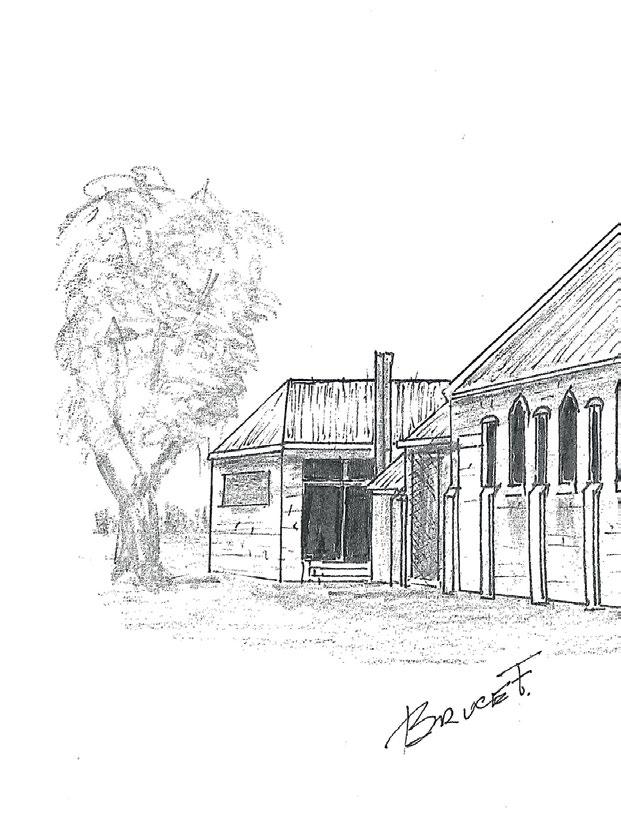
P29 30
From
Presbytery. I soon realised that a number of smaller churches had closed so I expanded my ideas to include all the churches from the Presbyterian, Methodist and Congregational faiths which had joined the Uniting Church.
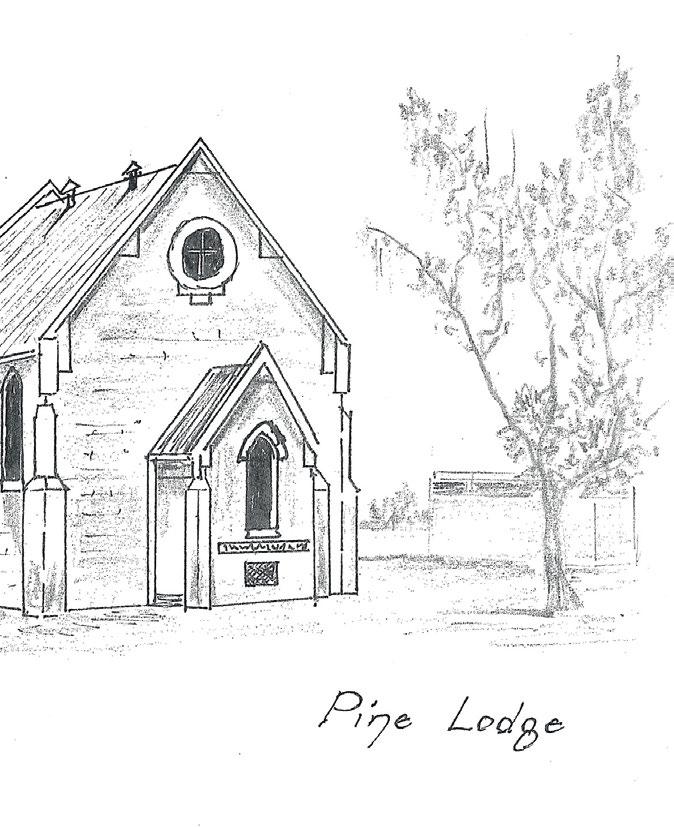
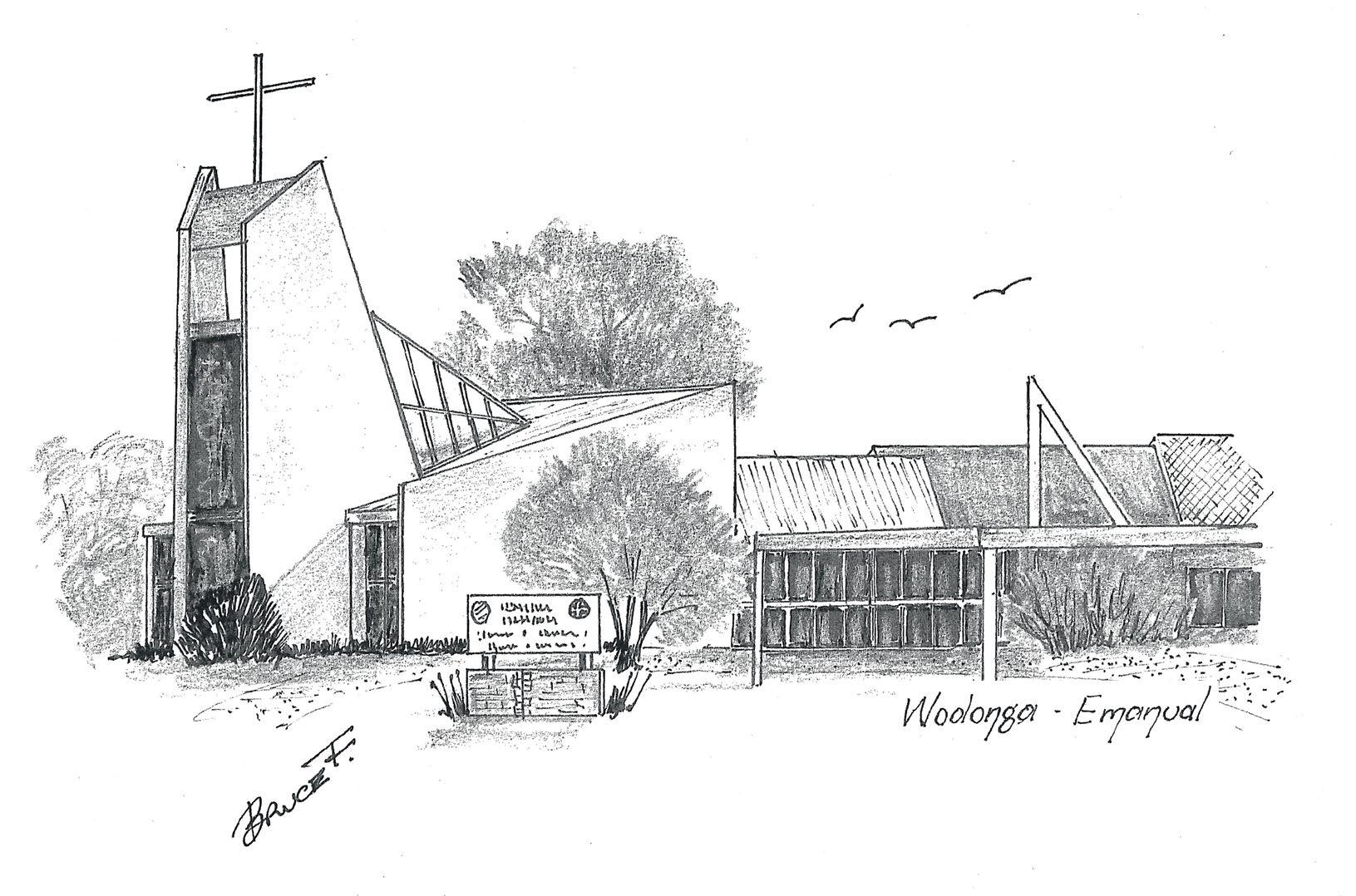
“I thought at first that would be perhaps 35-40 churches but I ended up with 99, quite a few of which have closed.”
Bruce says he usually draws from
photographs, which then allows him to take his time, but has also sketched “on site”.
“All I need is a small sketch book and a few pens and pencils,” he says.
“It usually takes a couple of hours to do a sketch, depending on the type of building, surrounds, etc.
"I use artist’s discretion in changing the drawings, that is, deleting unsightly additions or trees.”
When asked which are his favourite sketches he nominates St David’s and Bright Uniting Church.
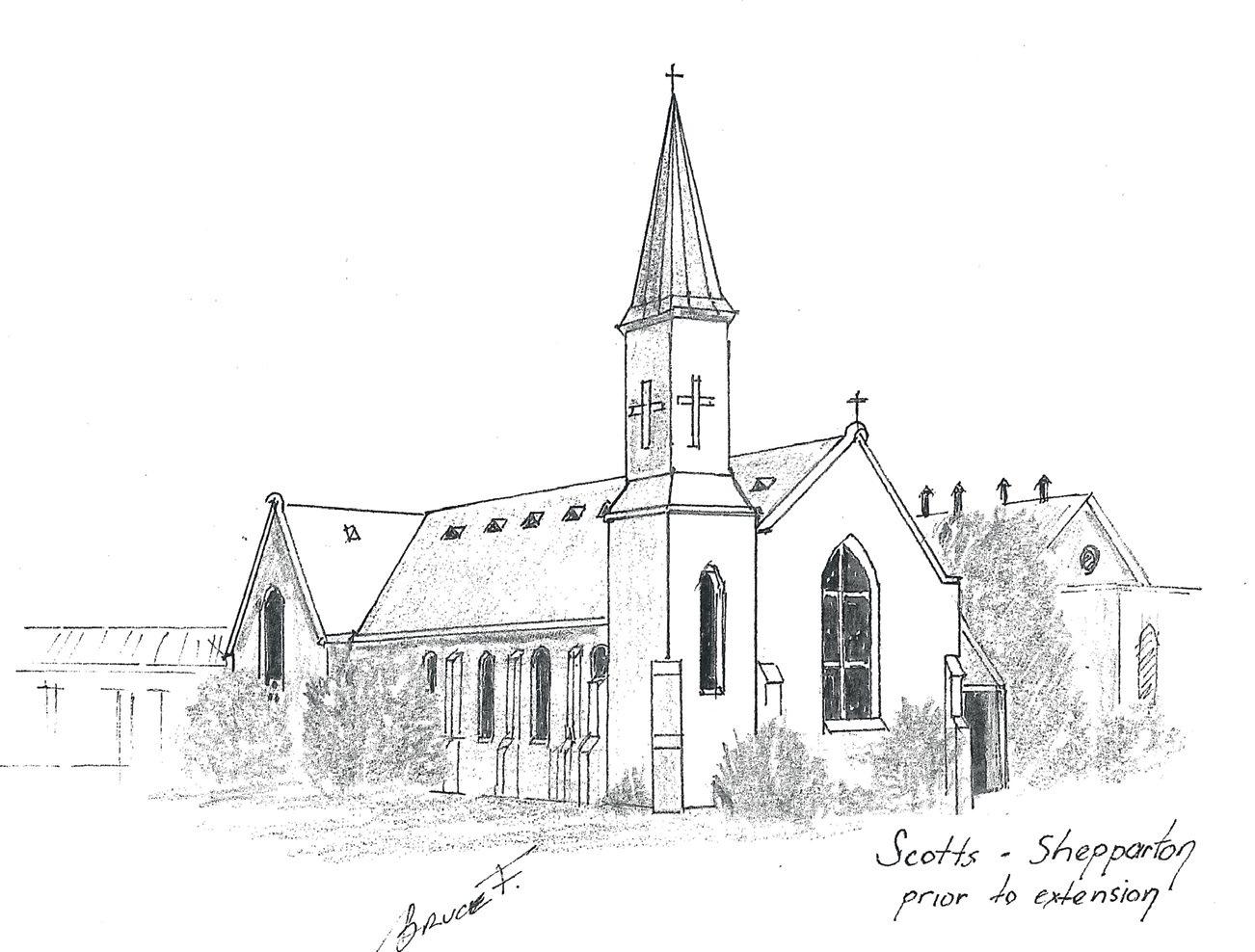
“St David’s is a personal thing as it has been my home church for many years,” he says.
“Bright is a pretty church in a traditional style which also has a family connection because my sister attended for many years and her four children were christened there.”
31
Opening the door to fai h
By Andrew Humphries
When Anne Pate is asked what her role as Missional Spirituality Pastor with Northcote Uniting Church involves, she admits she isn’t 100 per cent sure.
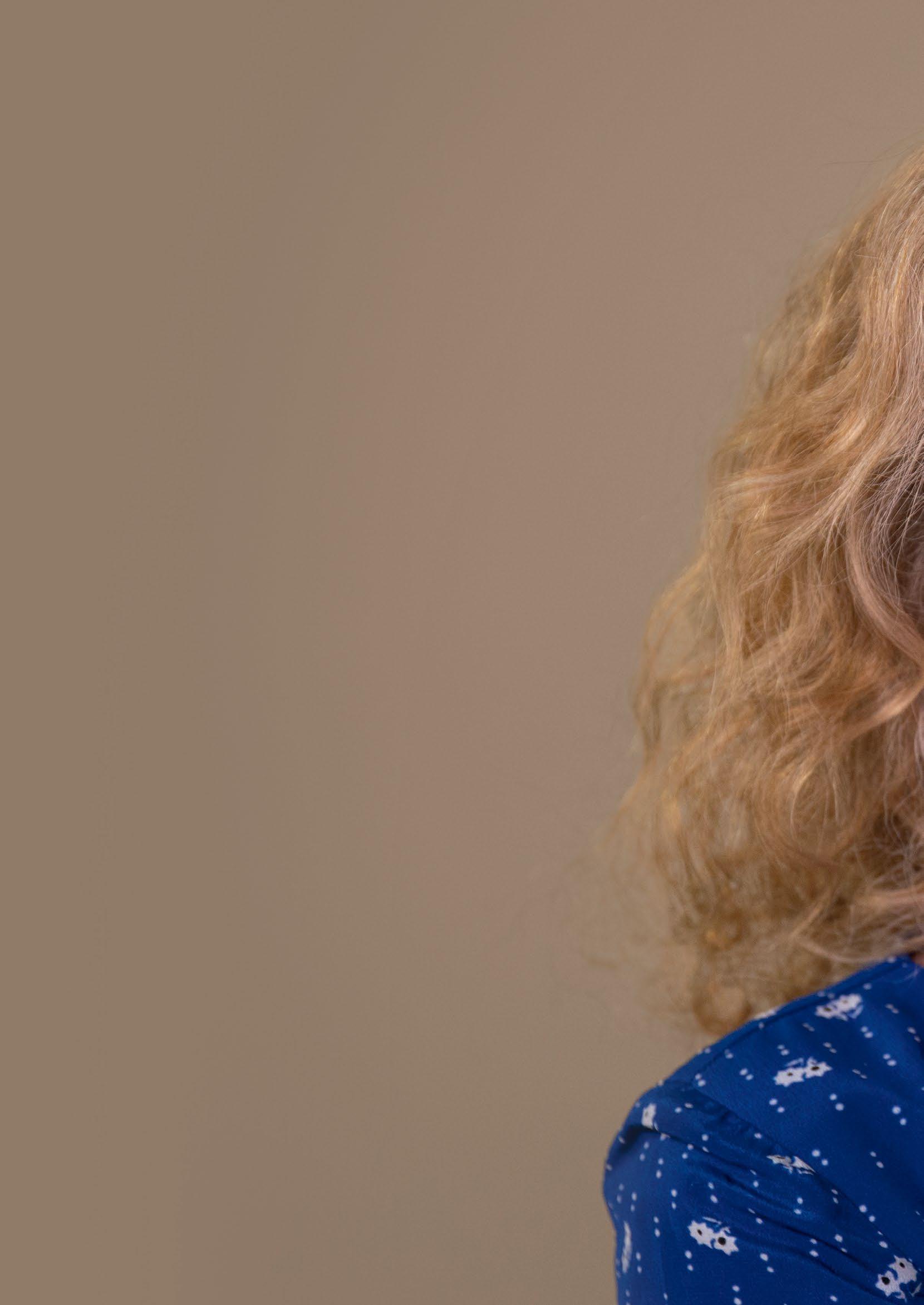
To be precise, she says, it’s a work in progress.
“Well, we’re still reflecting on exactly what we mean by that title,” she says with a laugh as she describes her and husband and Minister Alister’s approach to the role.
“Essentially, it’s about bringing the riches of the Christian tradition to the front door of the church, and not hiding them at the back.
“We want to put the gifts of our spiritual tradition to the work of mission, and to place them at the front door of
the church, rather than leaving them down the back as something for religious professionals, not relevant to ordinary people.
“I draw on my experience and formation as an Ignatian spiritual director to make these gifts more widely available.
“What we want to explore is how we can make available some of those riches of the Christian tradition in ways that can connect in a contemporary context, and this is something that we are exploring as a community.”
It’s as much about the journey, Anne says, as it is about the final destination. And for so many people, that journey involves the search for a sense of
Continued P34 32
Anne Pate is bringing the riches of the Christian tradition in a contemporary context to Northcote Uniting Church. Image: Carl Rainer
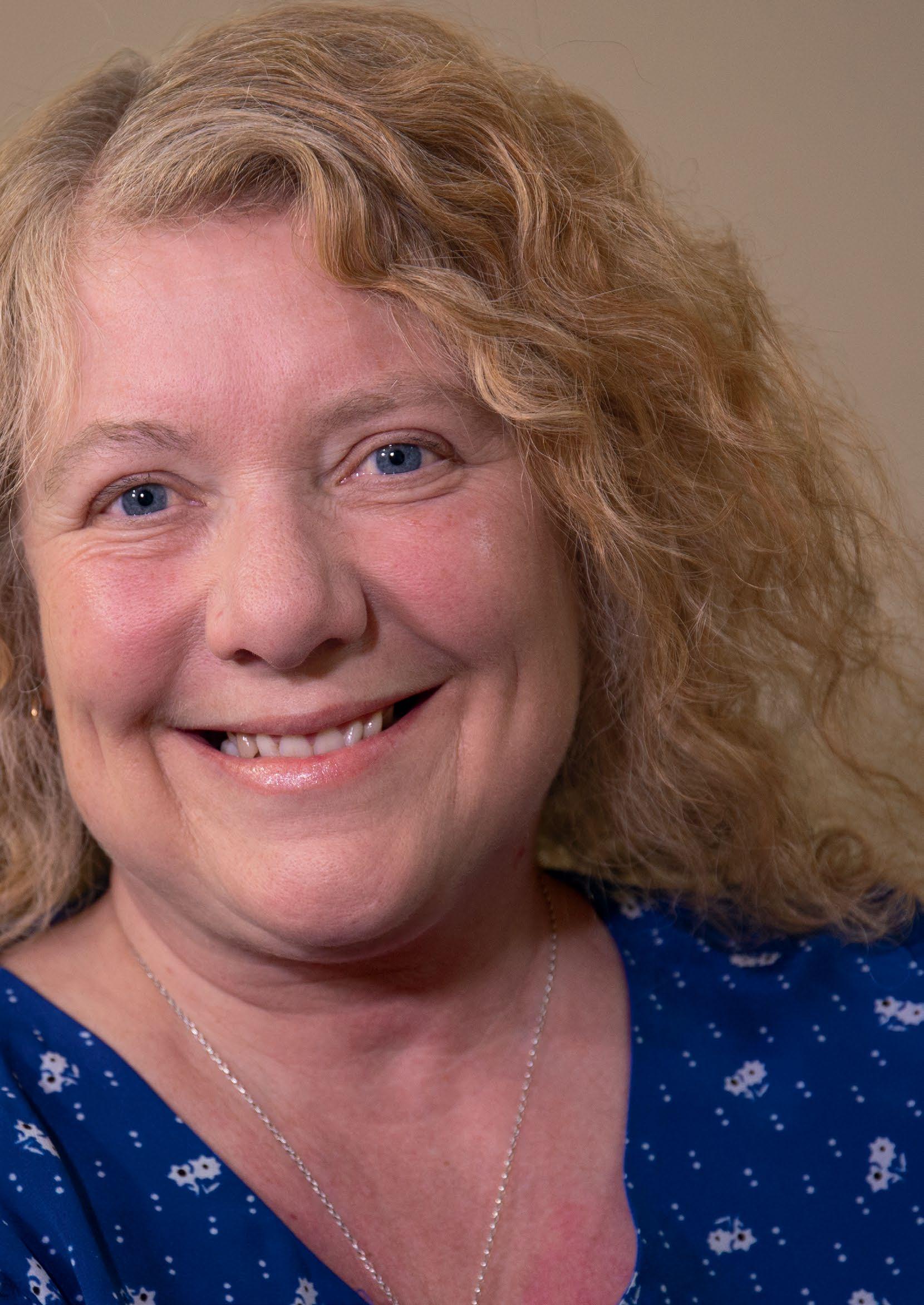
meaning in their lives. “Part of what we're trying to do with my role is to say that so many people in our culture are searching and seeking meaning, but they are not quite sure where to look and certainly wouldn’t initially think to look at church because church itself might not really appeal to many people,” Anne says.
“What we’re trying to say is that the Christian tradition has so much to offer, and it’s partly about how you offer it and make it available to people so that they can engage with it.
“It sometimes sounds clichéd to talk about this so-called search for meaning, but I think today it has become more important than ever.
“When I talk about that in terms of what we’re doing at Northcote, I mean
to their childhood, and have then found that the experience of going through Covid-19 has forced a re-evaluation in their thinking.
“People are still reeling from the pandemic and we certainly noticed towards the end of last year an increase in the number of people coming to see us as they began to feel a bit more confident in venturing out.”
One way of connecting, says Anne, is through making a retreat.
“I have been running retreats as part of Cafechurch since about 2013, and they were always one-day events until last year when we experimented and did a weekend gathering thanks to assistance from the Presbytery of Port Phillip West’s Simpson Fund,” she says.
“We went to Santa Casa in Queenscliff,
Northcote’s engaging double act
From humble beginnings more than 20 years ago, Northcote Uniting Church, or Chalice as it is also known, has developed into a booming and lively congregation after a recent refounding.
And at the heart of it all are Minister Rev Alister Pate and his wife Anne, Northcote’s Missional Spirituality Pastor.
“Chalice is a hub for a number of communities, all seeking to drink deep from the wellsprings of faith,” is its invitation to newcomers.
“We are a place for people of faith, people with hard questions, and people on a spiritual quest.
“We think you can have a serious, engaged Christian faith, and also be an inhabitant of post-modern, postChristian Melbourne.”
At the heart of Northcote, says Anne, is a youthful vitality and positivity about spreading the word of God.
two things: firstly, we are cultivating a deeper understanding of who we are, and how to be Jesus’ people in this time and in this place.
“We are also focused on what we do at Northcote, which is that with God we will co-create a life-giving community in which the love of God is palpable.
“We seek to hold space for all people as we discern God’s call and participate in God’s project of liberation and love for the world.”
At the centre of what Northcote offers, says Anne, is the ability to facilitate connection with people on an individual level, rather than as part of a one-sizefits-all model.
“I'm always trying to think about how this can connect, and whether people feel they have to buy the whole story in order to be able to connect with the experiences that we offer,” she says.
“We have noticed that since pandemic lockdowns ended we have had quite a few people come to us who are searching for answers.
“Some of them may have had some experiences with Christianity going back
which is run by the Sisters of Mercy, and we also promoted it outside our community and it was a great success.”
So successful was it as a weekend event that it will take place again this year from November 24-26.
It’s an opportunity, says Anne, for people to take the time out from their often busy lives to reconnect with God.
“Those who attend are able to embrace both time together with other people but also time by themselves,” she says.
“It’s not a silent retreat, but there is that opportunity to make use of the value of silence.
“But there is also plenty of time for people to come together and that can take place through activities like music and poetry, so there is a real creative side to it all.
“So the invitation for people is to come as you are and to be aware of what it is that you might need during this time, and to consciously set aside time for God."
Further information from Anne at annepate@hotmail.com
“We're a relatively young congregation and I think our average age is about 36,” she says.
“We've got some people in their early 20s and I'm in my mid 50s, and I'm one of the oldest.
“That age demographic is what people often notice about us when they meet for the first time.”
It’s been quite a journey for Alister and Anne, and for the Cafechurch community which began 20 years ago and met in cafes and pubs until 2019.
In 2019, Alister was commissioned as Northcote Uniting Church Minister.
Members of the Cafechurch community joined Northcote UCA, and the spirited congregation has continued to blossom as new members arrive.
“Part of the joy for us is being able to be in a church space, rather than a pub, which allows us to do more reflective and contemplative things,” Anne says.
“We've certainly arrived in Northcote with a strong sense of mission and an emphasis on social connections.”
As a husband-and-wife team, Anne says she and Alister balance their responsibilities nicely and, while they
34
"it’s about bringing the riches of the Christian tradition to the front door of the church"
Missional Spirituality Pastor Anne Pate
From P32
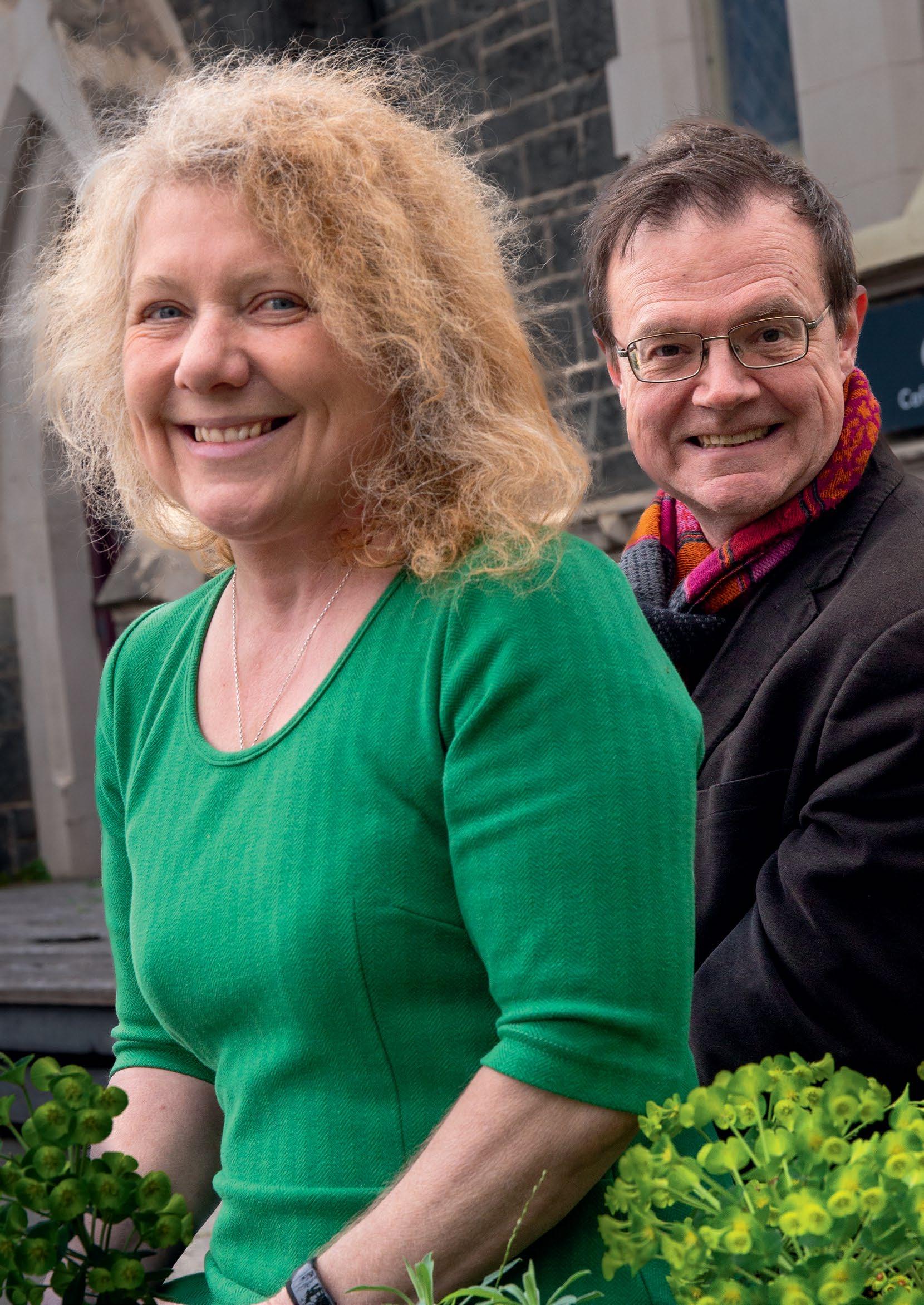
may do things a little differently, a strong commitment to the Christian faith is at the heart of what they are about.
“I think we do balance each other well and what we’re trying to do is to offer that Christian tradition in a way that people can engage with,” she says.
Anne Pate and her husband Alister.
Image: Carl Rainer
Why study Nurture and Spiritual Guidance of Children at Pilgrim?
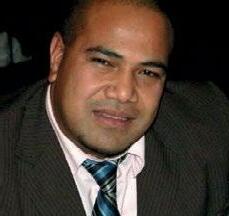
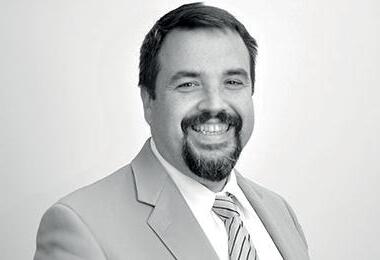
Explore contemporary issues in the spiritual lives of Children
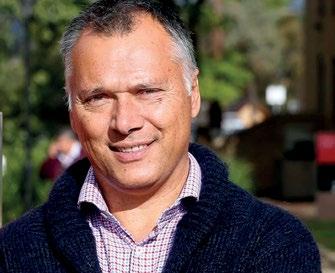
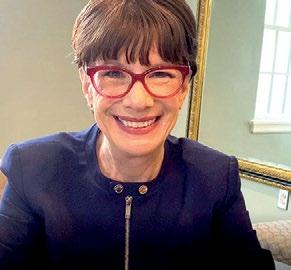
Examine links between Scripture, theological thought and psychological development, and modes of ministry practice with children

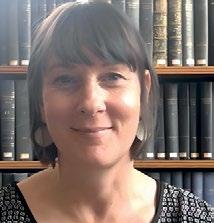
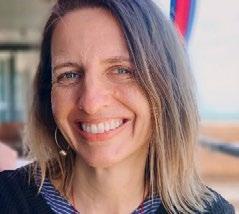
Learn in an immersive, multi-sensory learning environment Complete the unit in a six-day intensive (22-24, 27-29 Nov)
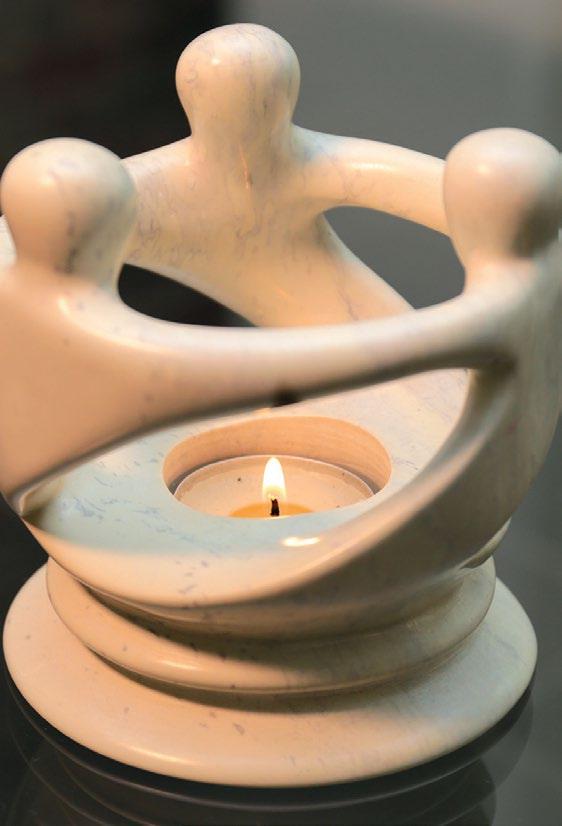

36 AMY-JILL LEVINE KEYNOTE KEYNOTE KEYNOTE STAN GRANT REV. DR RICK DACEY REV. DR SALLY DOUGLAS REV. DR KYLIE CRABBE REV. SALESI FAUPULA Visit Preachfest.org.au or scan the QR Code for more information. Tickets are on sale now! Joint conference by Uniting Church Synods of VIC/TAS and NSW/ACT Proclaiming the Inspirational and Transformational Word 1- 3 NOVEMBER Wesley Church Melbourne St Stephen’s Uniting Church, Sydney and Online PreachFest! is a 3-day festival focusing on the vocation of preaching. People from around Australia will gather to be inspired by experienced preachers and learn more about the craft from world-class teachers and theologians. Livestream In-Person Livestream A variety of workshops are on offer!
More information study@pilgrim.edu.au
Pilgrim is the theological college of the Uniting Church in Victoria and Tasmania 230824_Pilgrim half page.indd 1 24/08/2023 3:26:40 PM
03 9340 8892
Watch Synod 2023 live!

All main sessions will be shown online including the OPENING WORSHIP service, which will be live-streamed from the Box Hill Salvos complex at 1010 Whitehorse Road, Box Hill on Saturday, November 18 from 10am. To watch Synod 2023, visit our website www.victas.uca.org.au and follow the links.
Crosslight is a bi-monthly magazine produced by the Communications and Media Services unit of the Uniting Church in Australia Synod of Victoria and Tasmania.
Opinions expressed in Crosslight do not necessarily reflect those of the editor or the policies of the Uniting Church.
Advertising
Crosslight accepts advertising in good faith. Acceptance of advertising does not imply endorsement. Advertising material is at the discretion of the publisher.
Advertising deadlines for December
Christmas Issue:
Bookings
October 18, 2023
Copy & images for production
October 25, 2023
Print ready supplied PDF
November 15, 2023
See crosslight.org.au for full details.
Distribution
Crosslight is usually distributed the first Sunday of the month.
Circulation: 16,000
Editor Andrew Humphries
Ph: 0439 110 251 andrew.humphries@victas.uca.org.au
Graphic design, Photography and print services Carl Rainer (03) 9340 8826 carl.rainer@victas.uca.org.au
Advertising and Distribution
Andrew Humphries Ph: 0439 110 251 andrew.humphries@victas.uca.org.au
UCA Synod office 130 Lonsdale St
Melbourne Victoria 3000
Feedback & correspondence crosslight@victas.uca.org.au
ISSN 1037 826X
Next issue: December, 2023
37
ucavictas ucavictas
Envir nment right f0r change
By Andrew Humphries
In her four years as Minister at Koonung Heights Uniting Church, Heather Hon has come to appreciate deeply the level of the congregation’s commitment to creating a more sustainable world.
That commitment was recognised earlier this year through the Five Leaf Eco Awards, which honour a congregation’s work in promoting practices and policies which help our environment.

The awards are an Australian ecumenical environmental change program specifically designed for churches and religious organisations, assisting, inspiring and rewarding faith communities for taking environmental action and becoming more sustainable in response to God’s call to care for creation.
Koonung Heights joins a number of other Victorian and Tasmanian Uniting Church congregations to be recognised with Five Leaf Eco Awards.
Since 2010, Leighmoor UC, Sophia’s Spring in Brunswick, Brunswick UC, St Andrew’s UC in Fairfield, Warrandyte UC, St Luke’s UC in Highton, Clarence UC in Tasmania, Port Melbourne UC, St Luke’s UC in Mount Waverley, and Wesley UC in Geelong have received Five Leaf awards.
As she reflects on Koonung Heights’ recognition, Heather says it demonstrates that individual congregations have the power to make a big difference in caring for the environment and taking up the fight to combat climate change.
And while she might be an obvious figurehead, Heather is quick to point out that her role is just a small one, thanks to a social justice committee and congregation as a whole that works
extremely hard in the environmental space.
“I must say I’m extremely proud of our congregation, which has been active in this area long before I arrived,” she says.
“We have a good and vibrant group of people who are a big part of the community.”
As part of lessening its environmental footprint, Heather says the congregation has put a number of initiatives in place, including conducting an energy audit, converting from gas to electric heating, installing solar panels, and smaller but still important initiatives like printing only on recycled paper and inviting a presentation by a guest speaker from Lighter Footprints, a group focusing on climate change action in the Boroondara and Whitehorse council areas.
“It’s really a whole-of-church approach,” Heather says.
“For example, our property committee decided to explore the installation of solar panels and then looked around to see who they could get to come and do the installation, and how to prepare the church building for it.
“The social justice committee was the driver of the energy audit, an important way of gauging how effectively we are using energy."
Heather says climate justice fits in neatly with the congregation’s strong commitment towards social justice.
“I think many of us grew up thinking that the pinnacle of creation was humanity and humanity is what we focused on, and with that came an attitude of subduing the earth through control rather than care,” she says.
“I look at it now and I believe it’s all of
creation we need to care for. We have been gifted this world to live in and what we do in it affects us all.
“We might turn on a tap here and have clean drinking water, but other actions by us might affect people elsewhere in the world.
“These are things that impact the environment so much and change the balance of the world.”
As all of the accepted evidence tells us the world is experiencing climate change turmoil, Heather says it is congregations like Koonung Heights which must take up the baton and act now.
“While the world has always gone through changes in temperature, our understanding is that global warming has never happened as quickly as it is now,” she says.
“It leads to questions around what we can do to lessen the impacts of this that don’t actually negatively impact us too much. For example, it’s not a big deal for us to print on recycled paper here, but imagine if everyone did that.
“So when we’re looking at which energy provider to use, or how we heat our buildings, let’s look at options which are more environmentally friendly and sustainable.”
As the battle for the environment continues, Heather says worship itself is a vital tool in the ongoing struggle.
“We are always looking to bring environmental themes into our worship, and that’s a continuing initiative,” she says.
“I think within that, justice around our First Nations people, which is also really important to us, and climate justice are actually linked in many ways.”
38
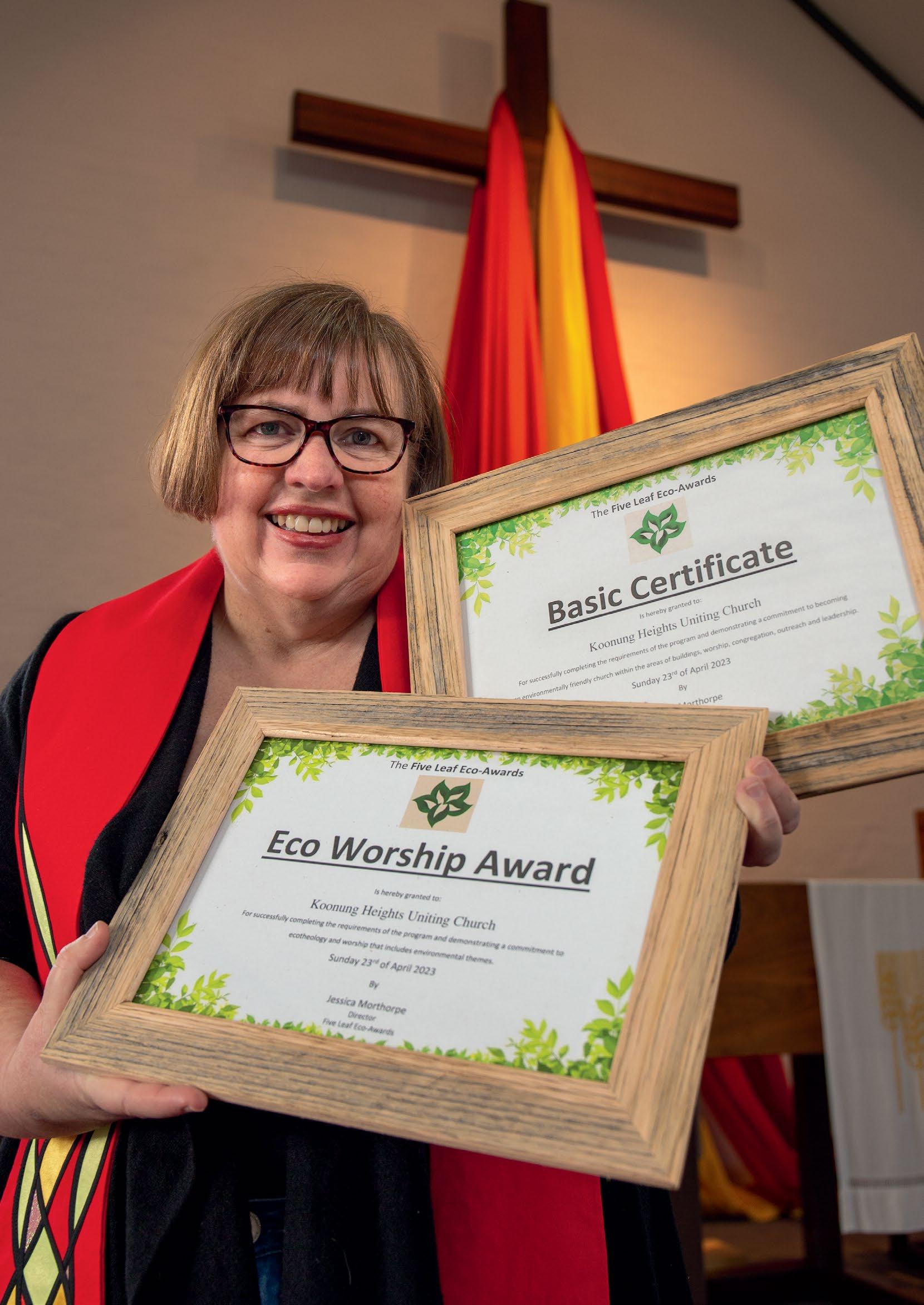 Koonung Heights Minister Heather Hon shows off the environmental awards won by the congregation.
Image: Carl Rainer
Koonung Heights Minister Heather Hon shows off the environmental awards won by the congregation.
Image: Carl Rainer
Sentiment: Joy to you at Christmas and happiness in the coming year.



2

Holly (Mixed Pack 2)
Green Holly sentiment: Warmest wishes for a wonderful Christmas and Happy New Year. Red Holly sentiment: May the festive season bring only happiness and joy to you and your loved ones.
Nativity 4
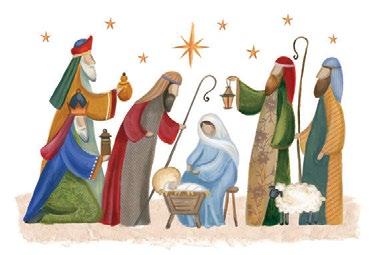
Sentiment: Sentiment: May you be blessed during the season of goodwill and may the new year bring peace and joy. Bible Verse: ‘For to us a child is born’ Isaiah 9:6.
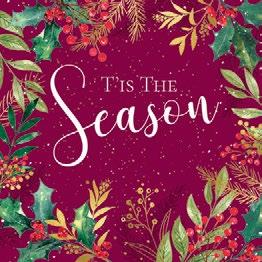

Peace Dove 5
Sentiment: May peace, love and prosperity follow you always.

40 Uniting is the community services organisation of the Uniting Church in Victoria and Tasmania. Please visit unitingvictas.org.au/christmas-cards or call 1800 668 426 to order your Christmas cards. Your purchase helps people in crisis this Christmas. Each pack of 10 cards is only $11 Let Christmas wishes support those in need. Scan to order online. the Uniting enliven communities children, young people and people newly experiencing financial crisis, and other drugs, thrive. About Uniting Vic.Tas Uniting Vic.Tas the community services organisation of the Uniting Church in Victoria and Tasmania. We work to inspire people, enliven communities and confront injustice. We’re about building capacity and confidence in children, young people and families, people living with disability, older people and people newly arrived. We work alongside people at risk of or experiencing financial crisis, homelessness, mental illness and problems with alcohol and other drugs, by empowering them with the support they need to thrive. Learn more unitingvictas.org.au 1 Australiana Wreaths (Mixed Pack 1) Flowering Gum Wreath sentiment: Season’s Greetings and best wishes for the coming year. Protea Wreath sentiment: Wishing you a very Merry Christmas and an especially happy New Year. About Uniting Vic.Tas Uniting Vic.Tas is the community services organisation of the Uniting in Victoria and Tasmania. We work to inspire people, enliven communities and confront injustice. We’re about building capacity and confidence in children, young people and families, people living with disability, older people and people newly arrived. We work alongside people at risk of or experiencing financial crisis, homelessness, mental illness and problems with alcohol and other drugs, by empowering them with the support they need to thrive. Learn more unitingvictas.org.au Printed in Australia About Uniting Vic.Tas Uniting Vic.Tas is the community services organisation of the Uniting Church in Victoria and Tasmania. We work to inspire people, enliven communities and confront injustice. We’re about building capacity and confidence in children, young people and families, people living with disability, older people and people newly arrived. We work alongside people at risk of or experiencing financial crisis, homelessness, mental illness and problems with alcohol and other drugs, by empowering them with the support they need to thrive. Learn more unitingvictas.org.au
About Uniting Vic.Tas Uniting Vic.Tas is the community services organisation of the Uniting Church in Victoria and Tasmania. We work to inspire people, enliven communities and confront injustice. We’re about building capacity and confidence in children, young people and families, people living with disability, older people and people newly arrived. We work alongside people at risk of or experiencing ancialfin crisis, homelessness, mental illness and problems with alcohol and other drugs, by empowering them with the support they need to thrive. Learn more unitingvictas.org.au
JLO1184 organisation of the Uniting people, enliven communities children, young people people and people newly experiencing financial crisis, alcohol and other drugs, to thrive.
3
Joy







































 Image: Carl Rainer
Image: Carl Rainer











 Merv Stanton is a keen gardener at the Queenborough Rise Community in Sandy Bay.
Merv Stanton is a keen gardener at the Queenborough Rise Community in Sandy Bay.































 Koonung Heights Minister Heather Hon shows off the environmental awards won by the congregation.
Image: Carl Rainer
Koonung Heights Minister Heather Hon shows off the environmental awards won by the congregation.
Image: Carl Rainer






